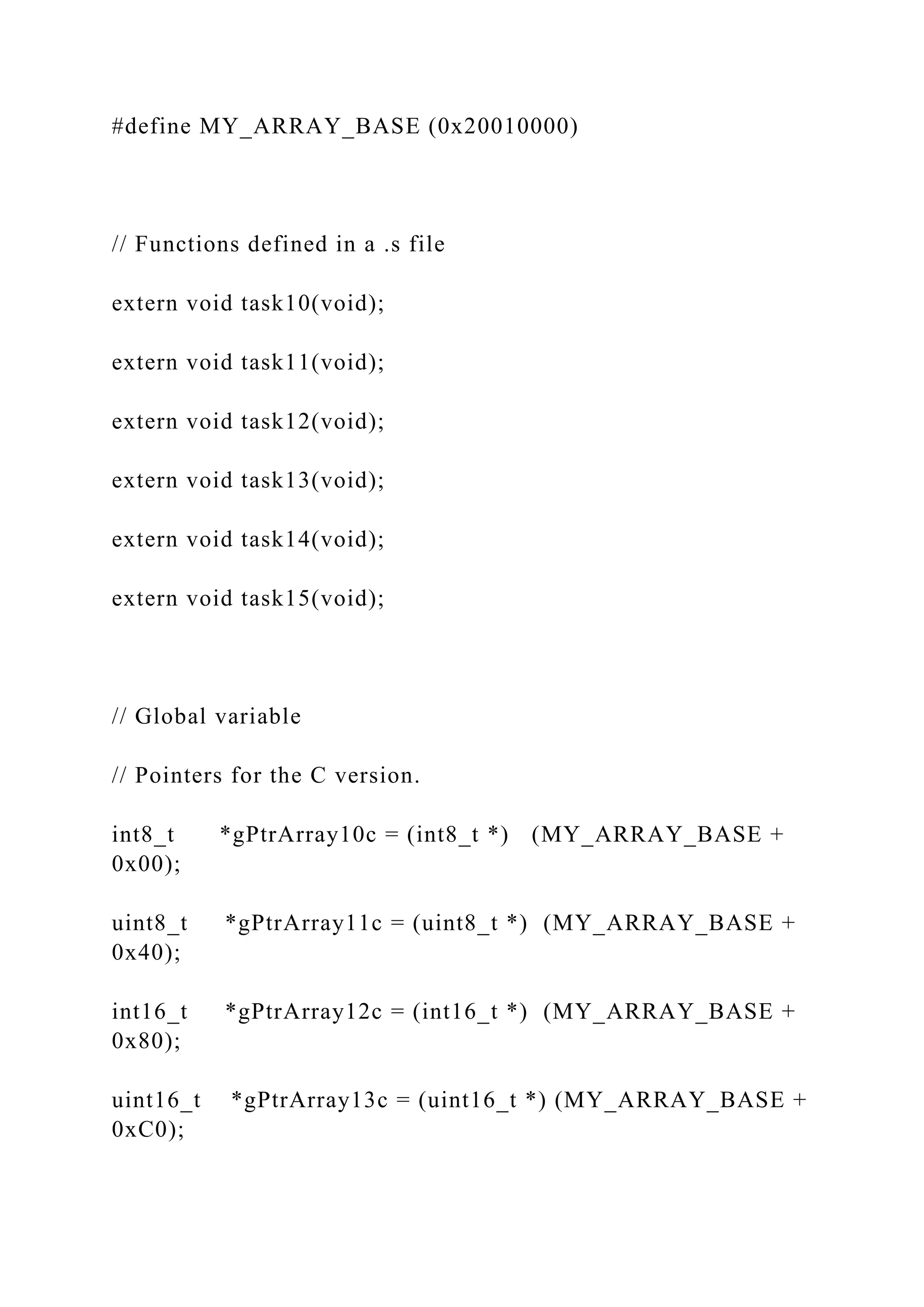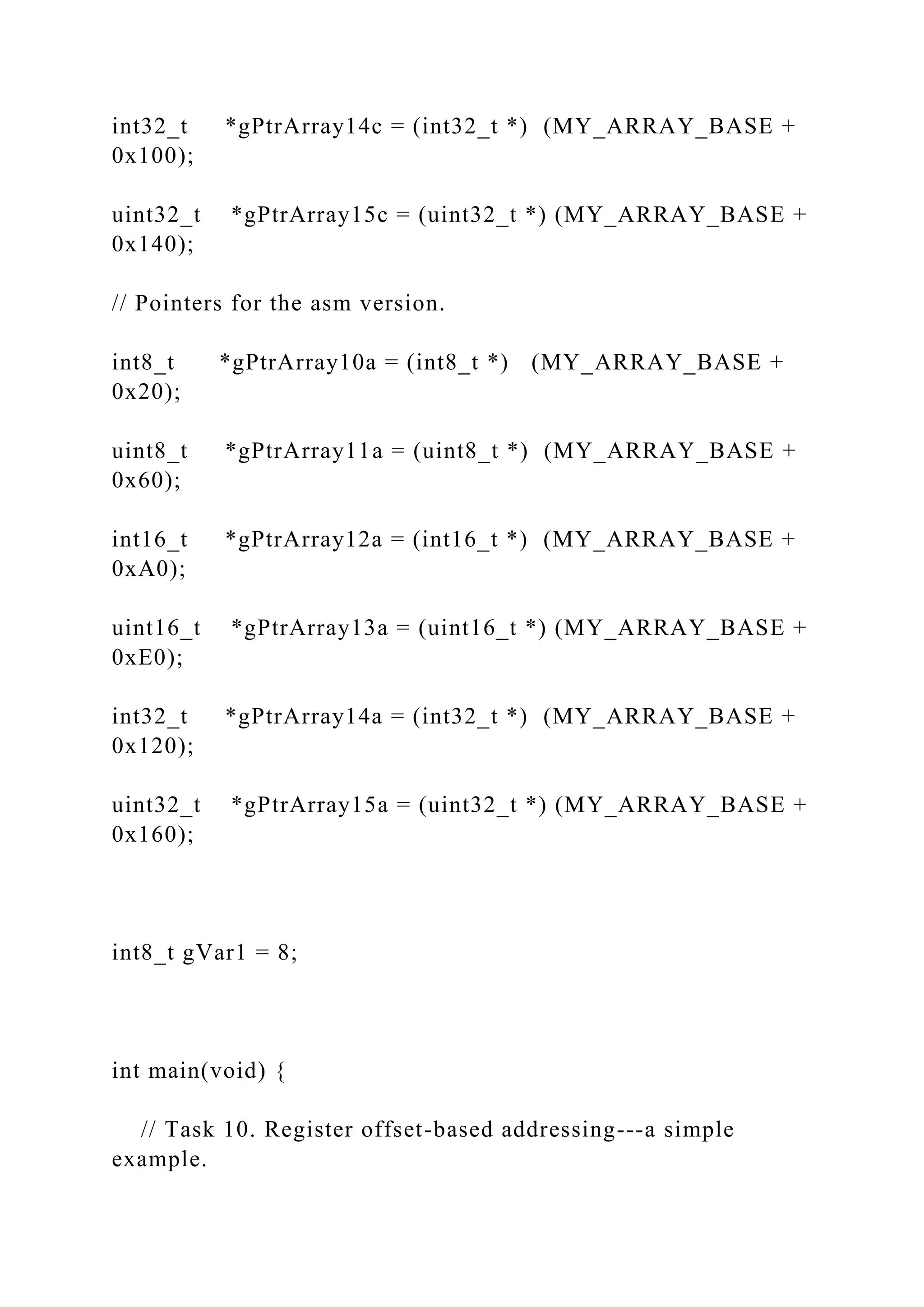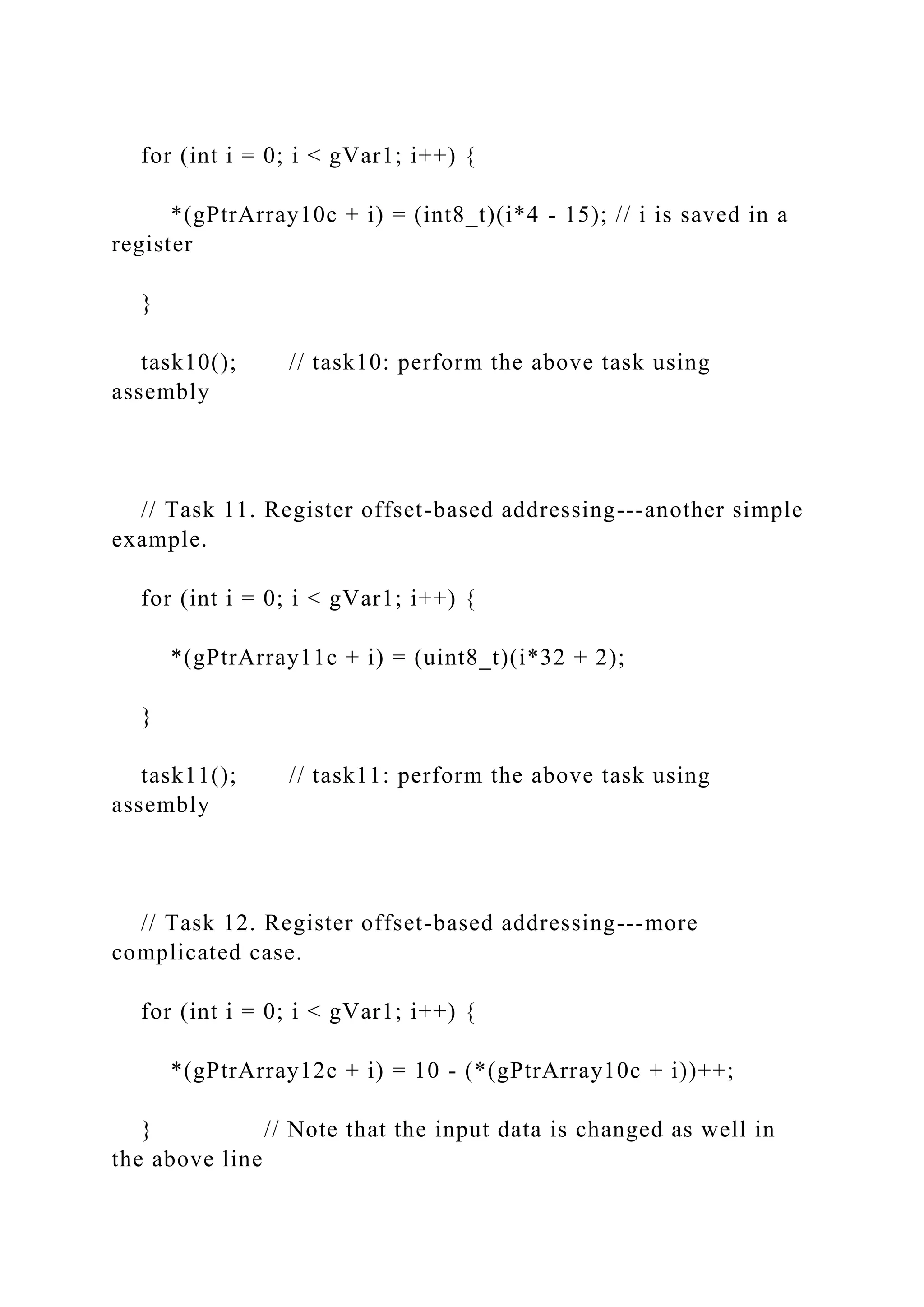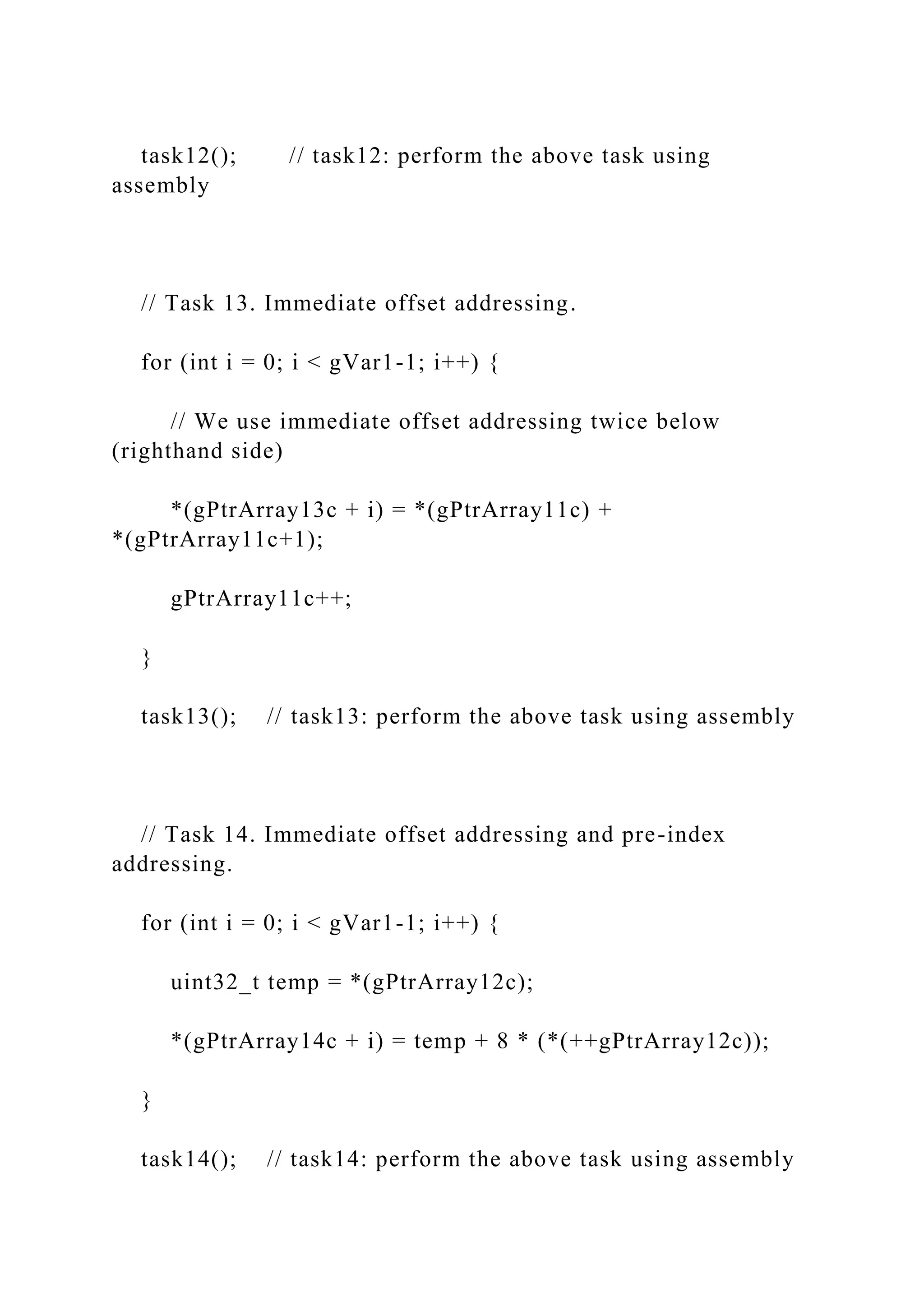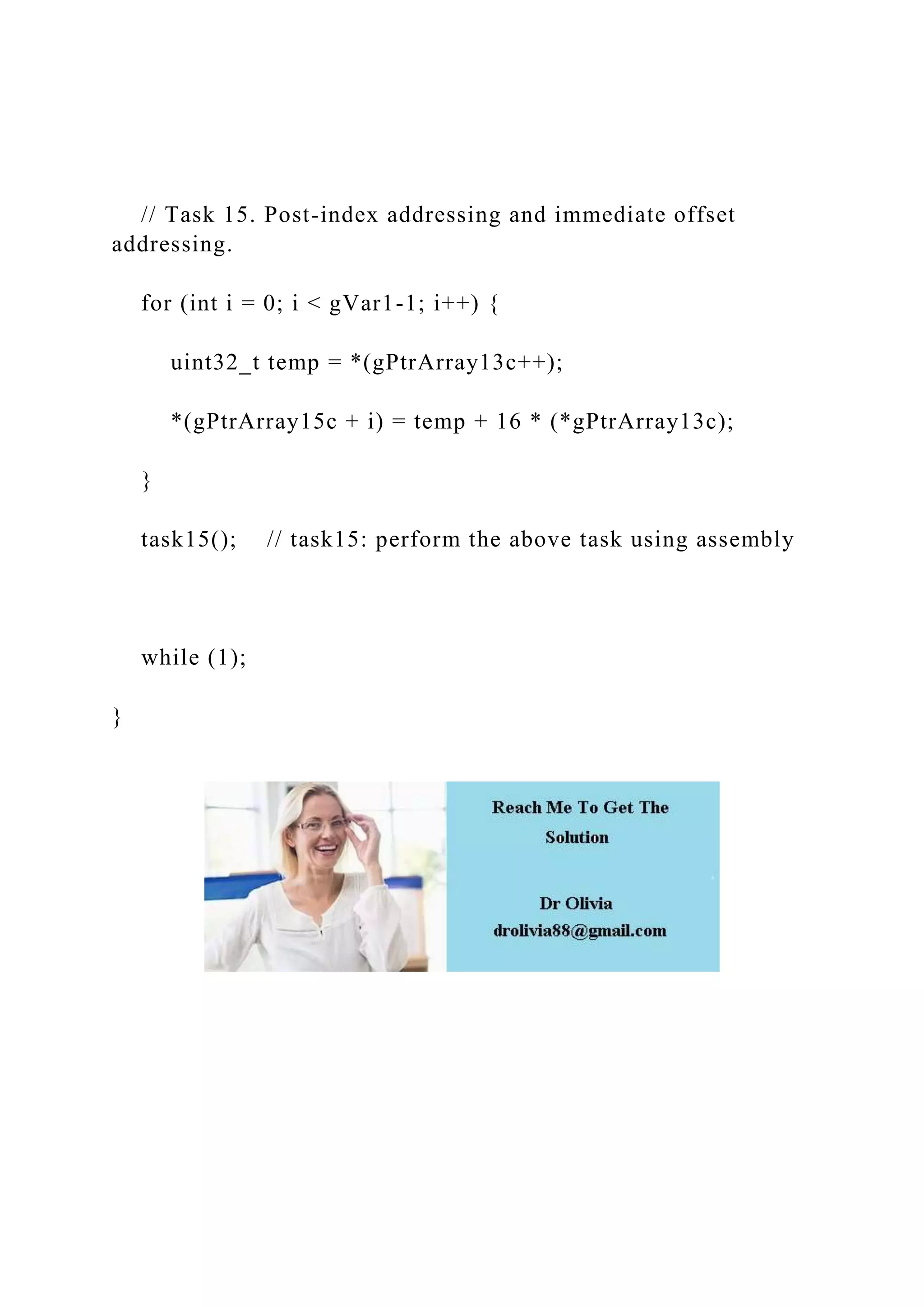This document outlines a uVision project configuration for an ARM Cortex-M4 processor, detailing the memory allocation, source files, and assembly tasks related to the development environment. It includes C and assembly language code snippets for various tasks demonstrating data manipulation and pointer arithmetic. The content also specifies external functions, global variables, and the setup for running the project using Keil software.
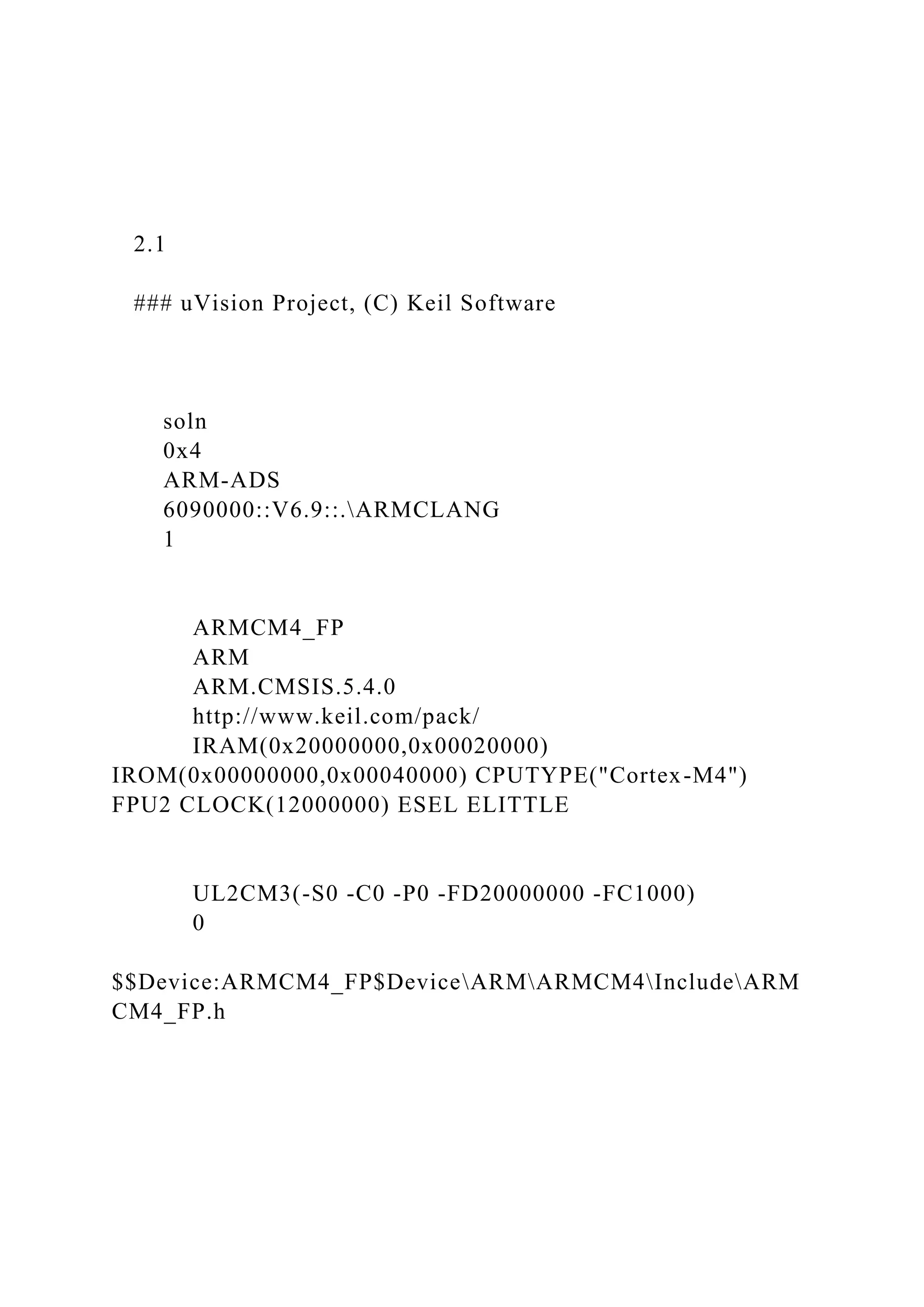
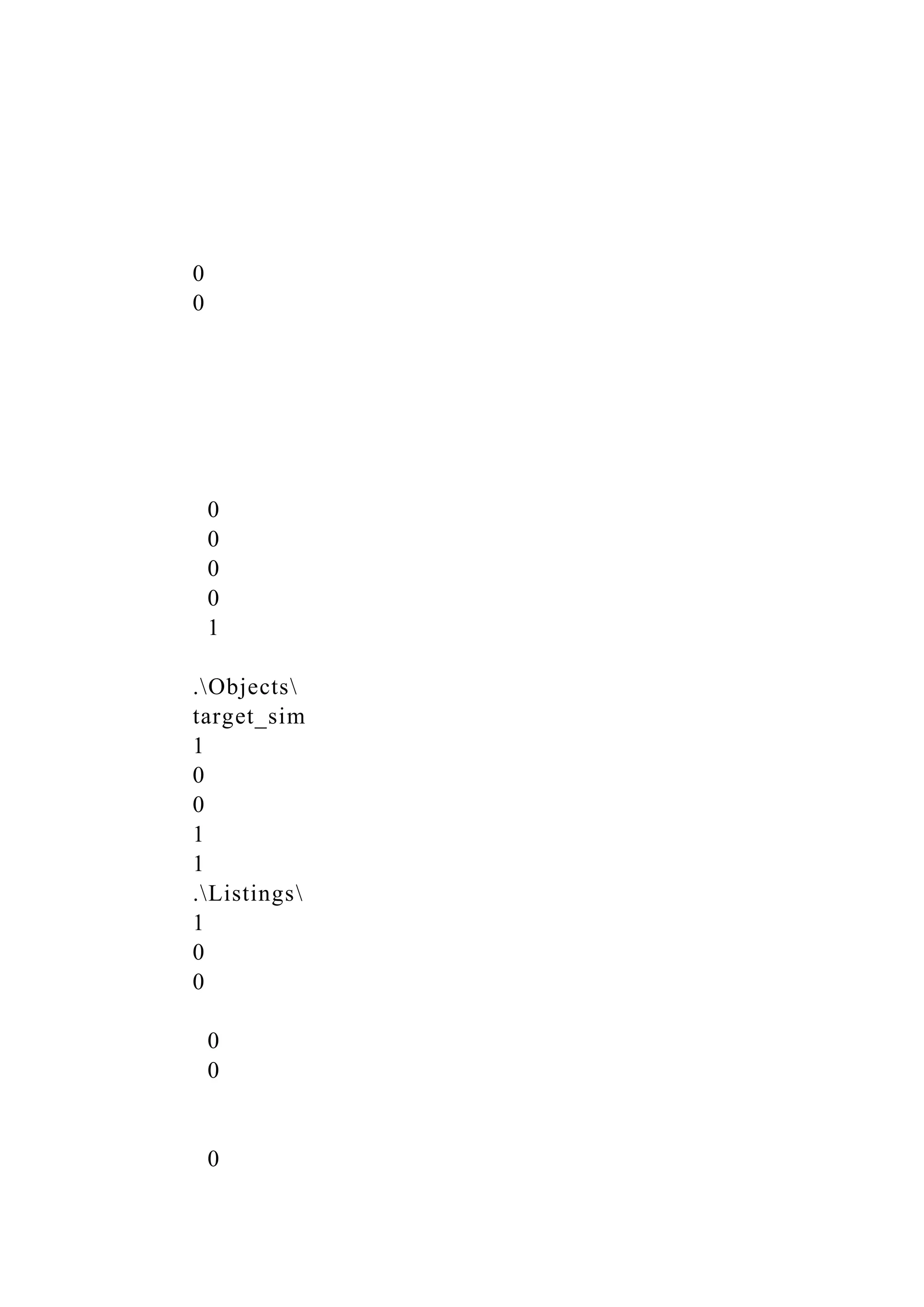
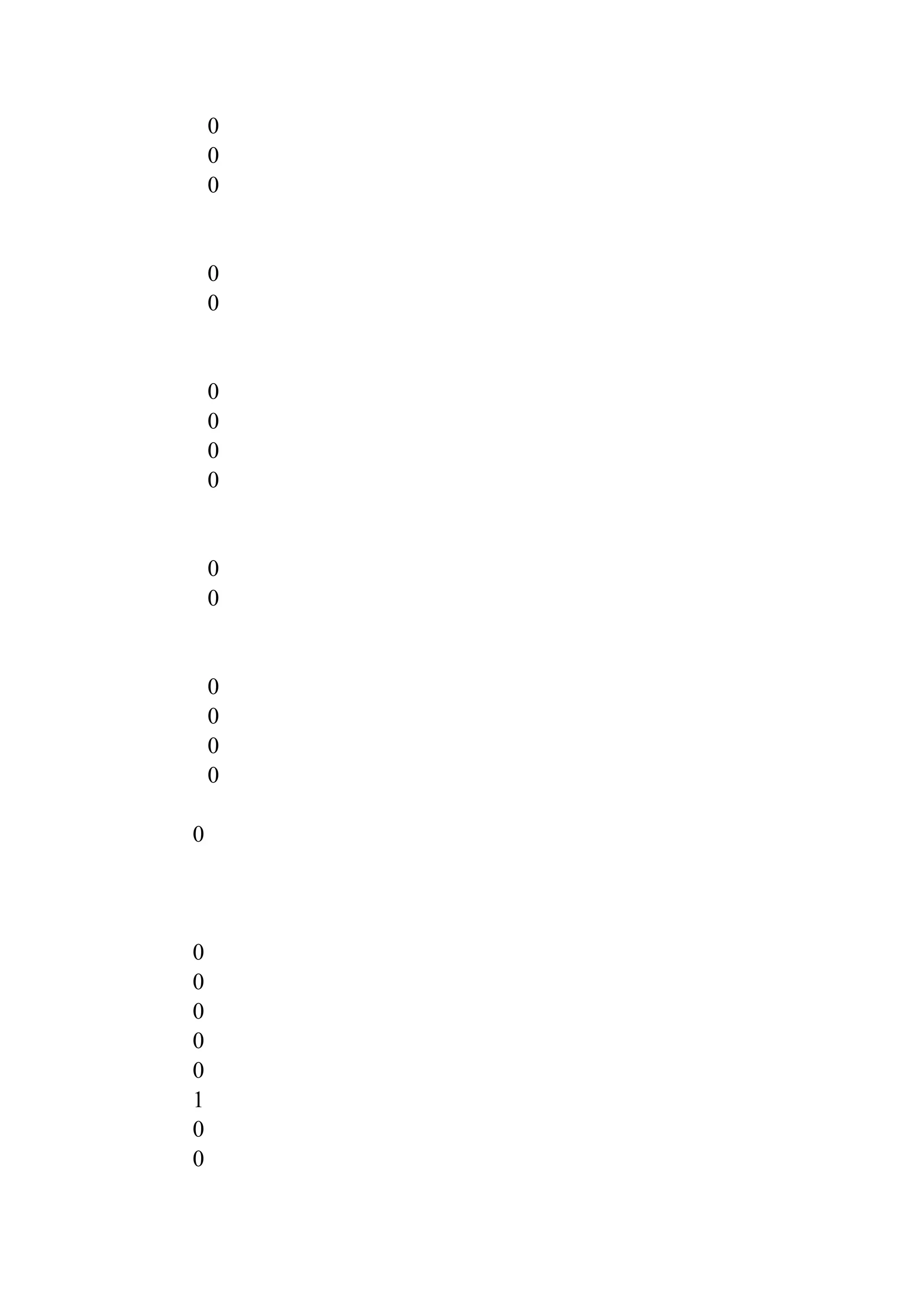
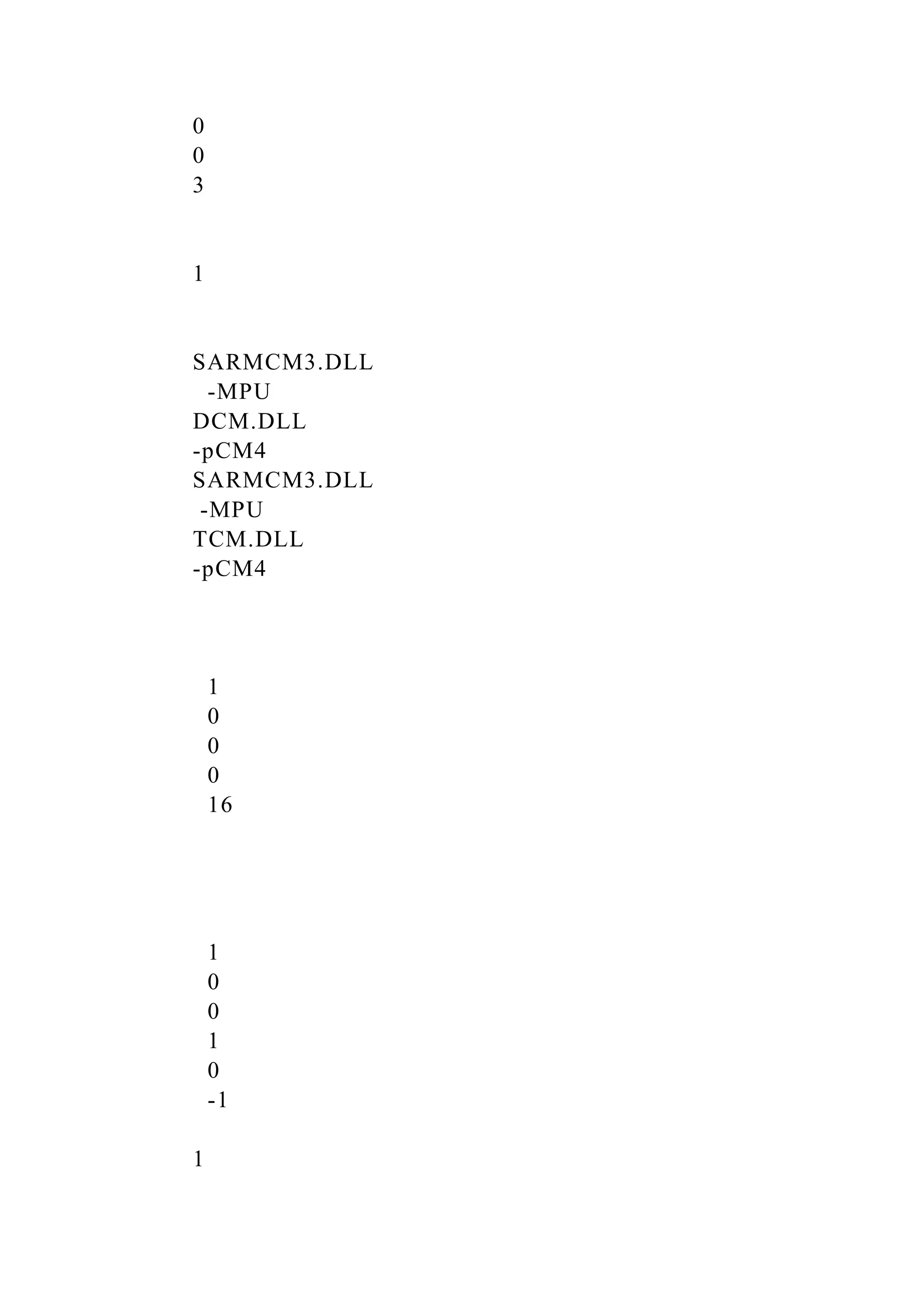


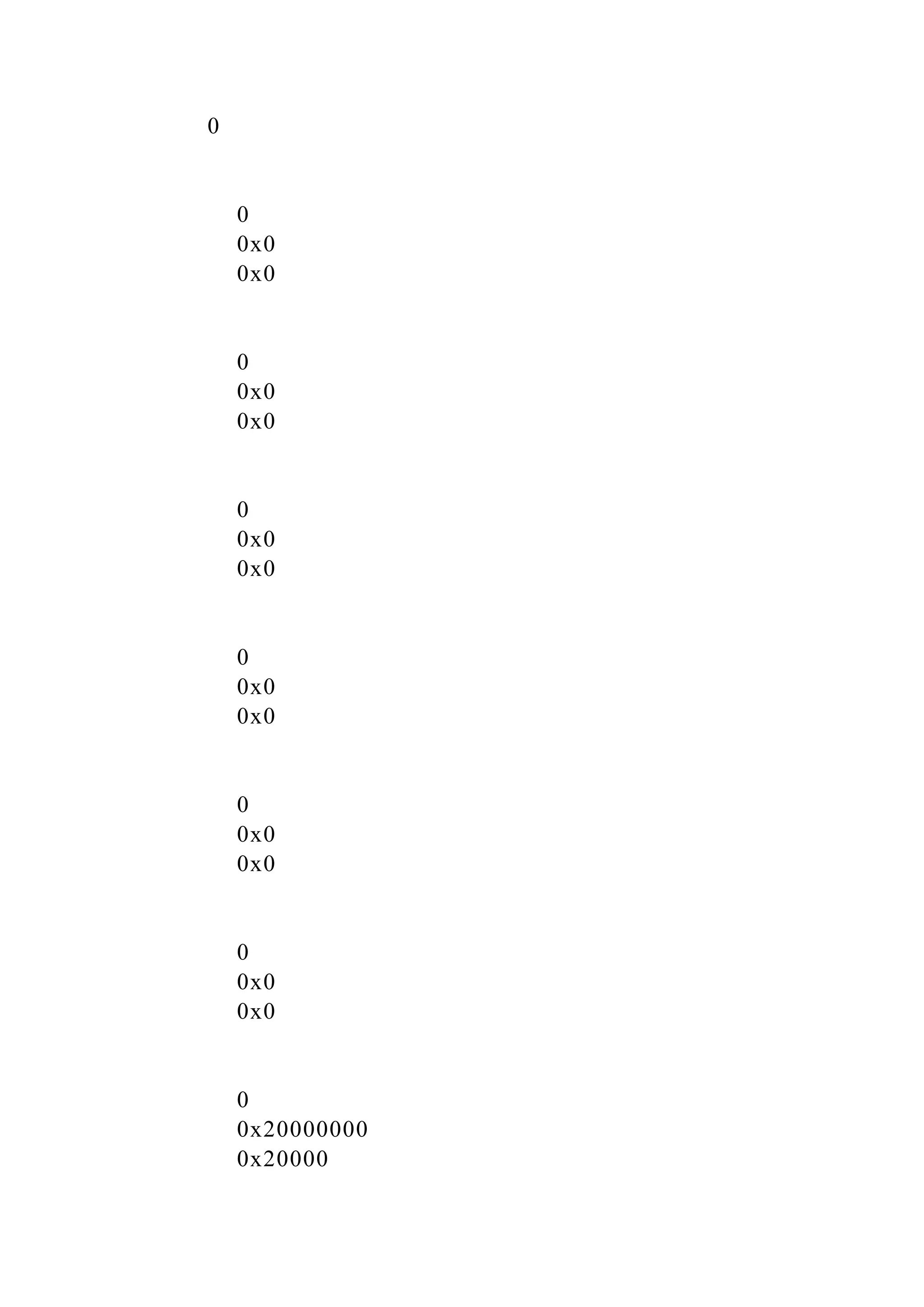
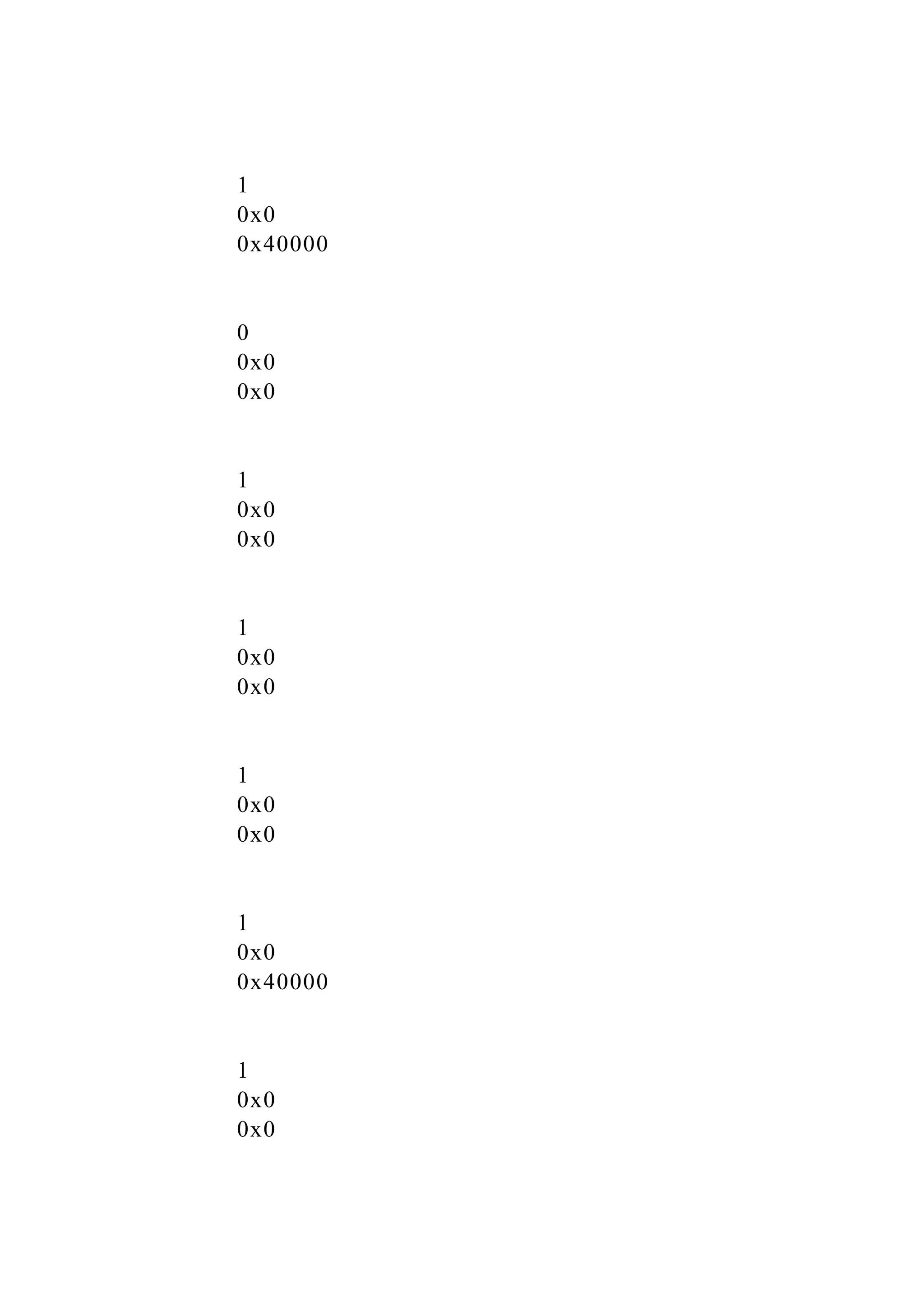
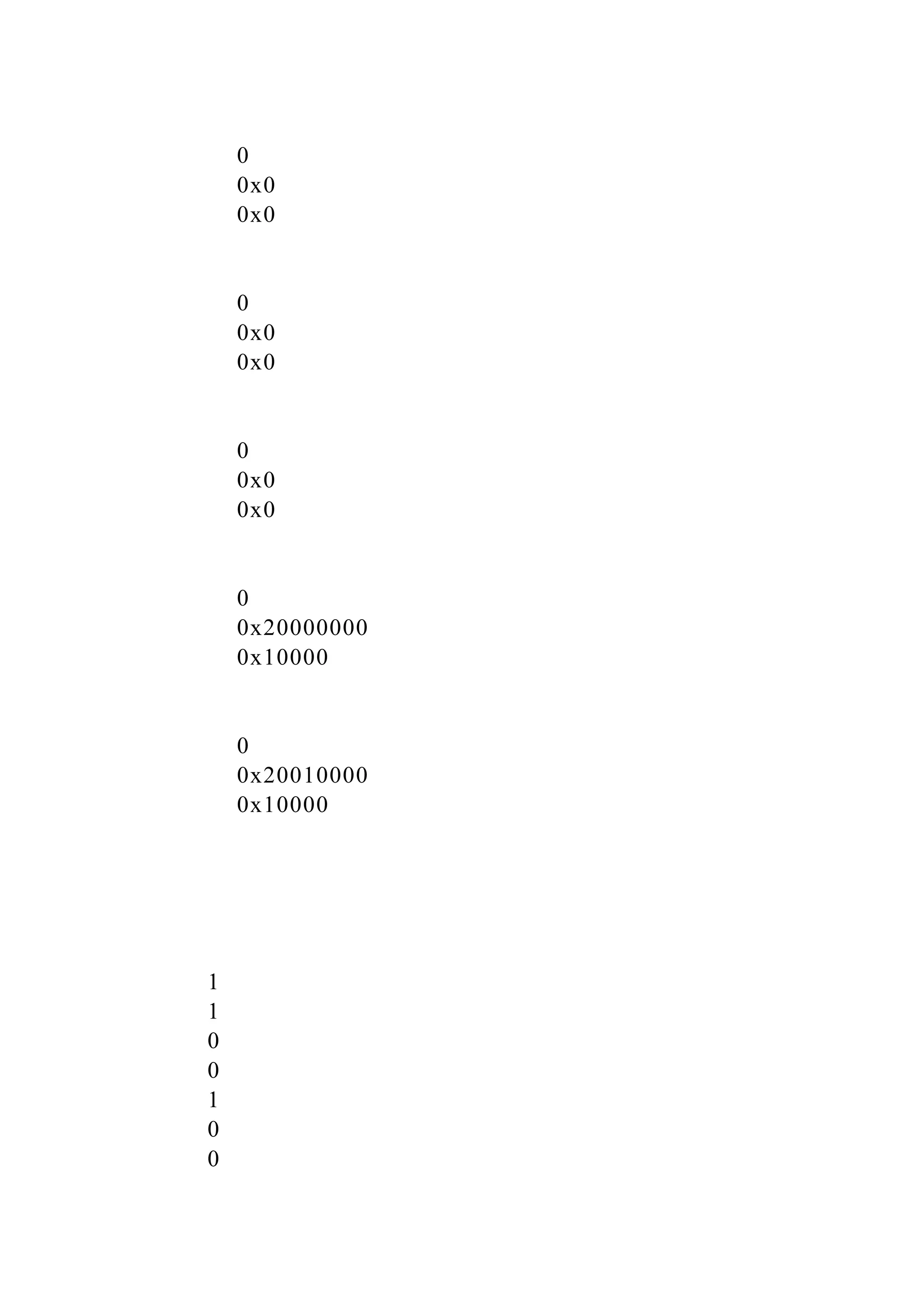

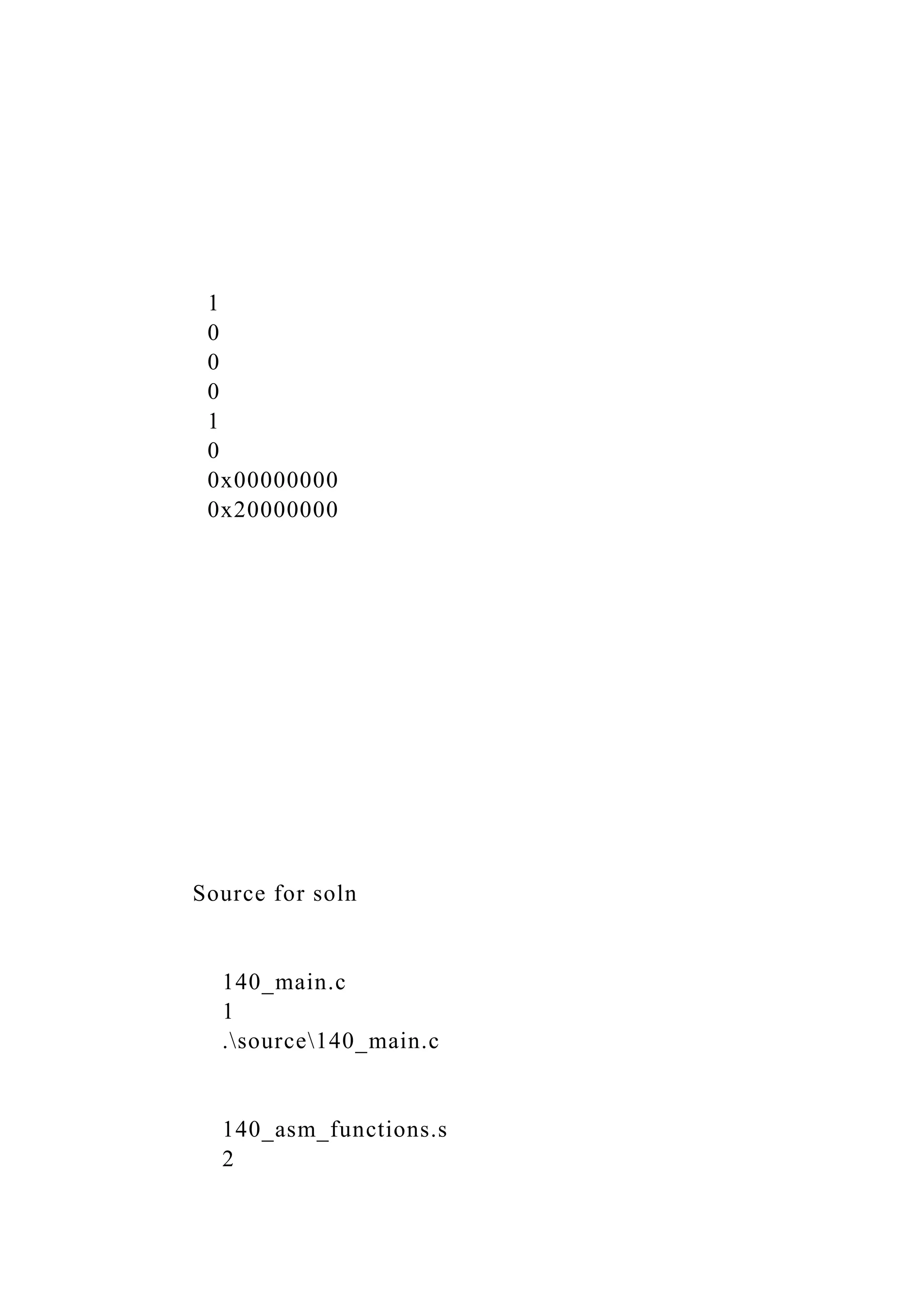
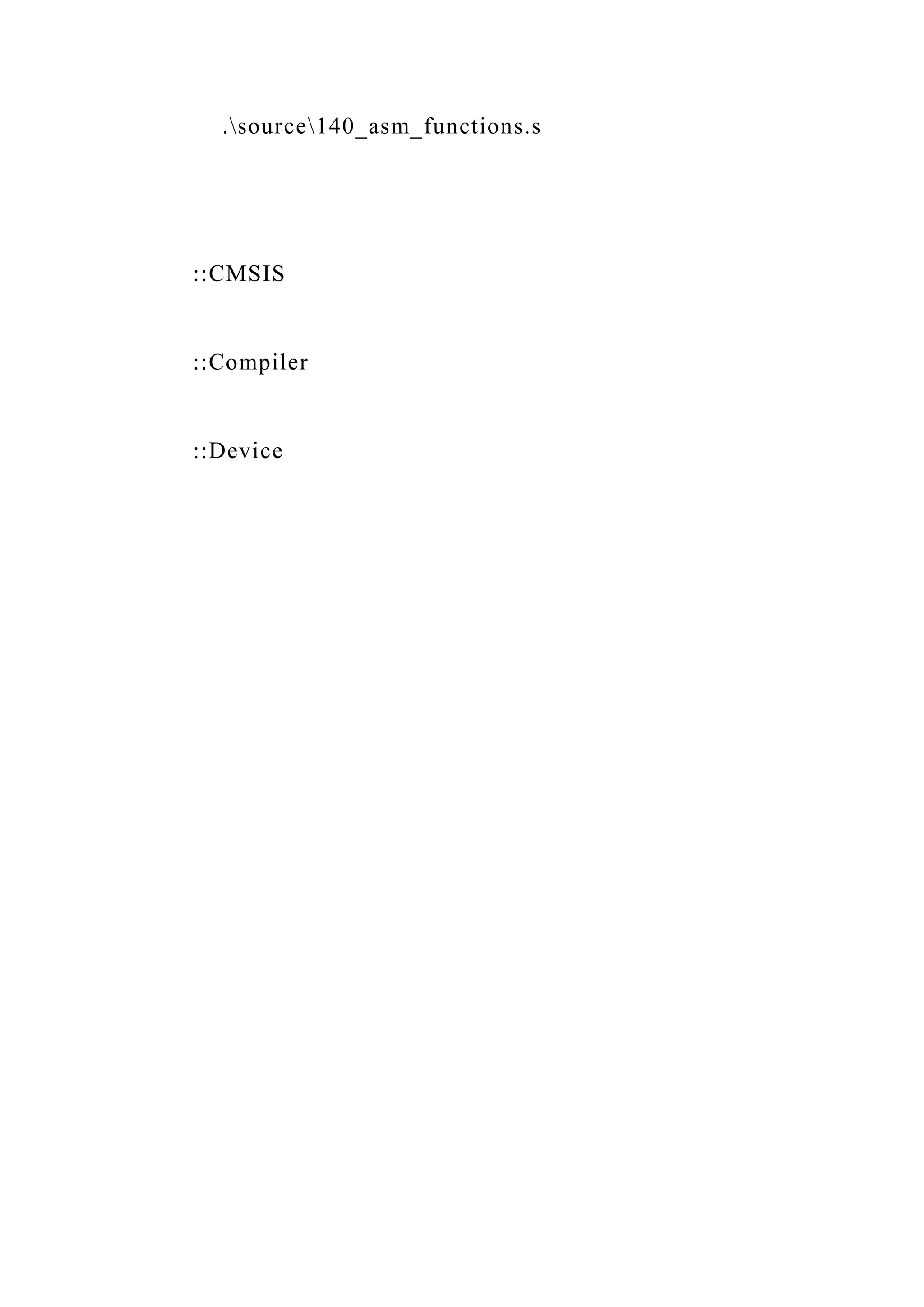
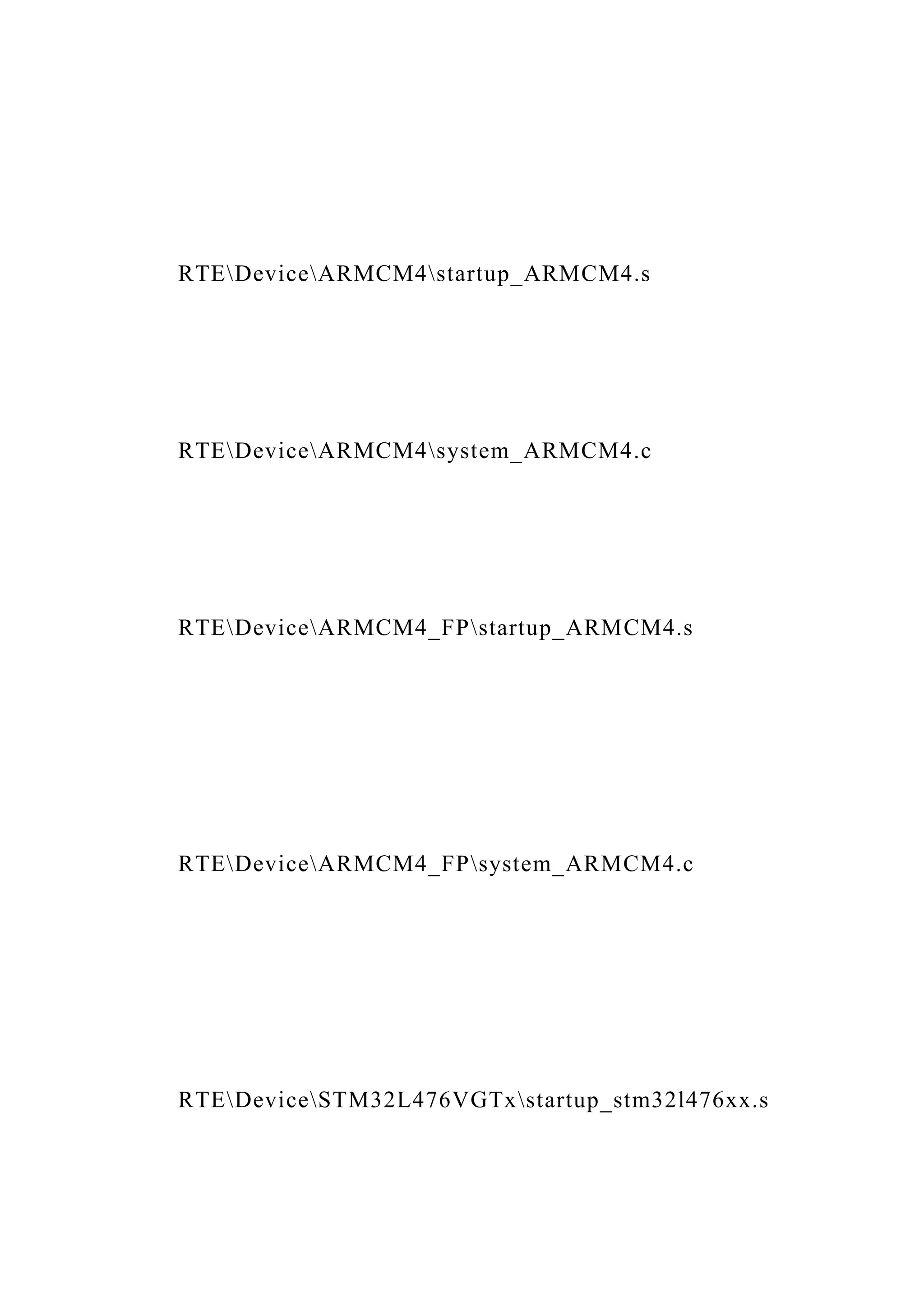
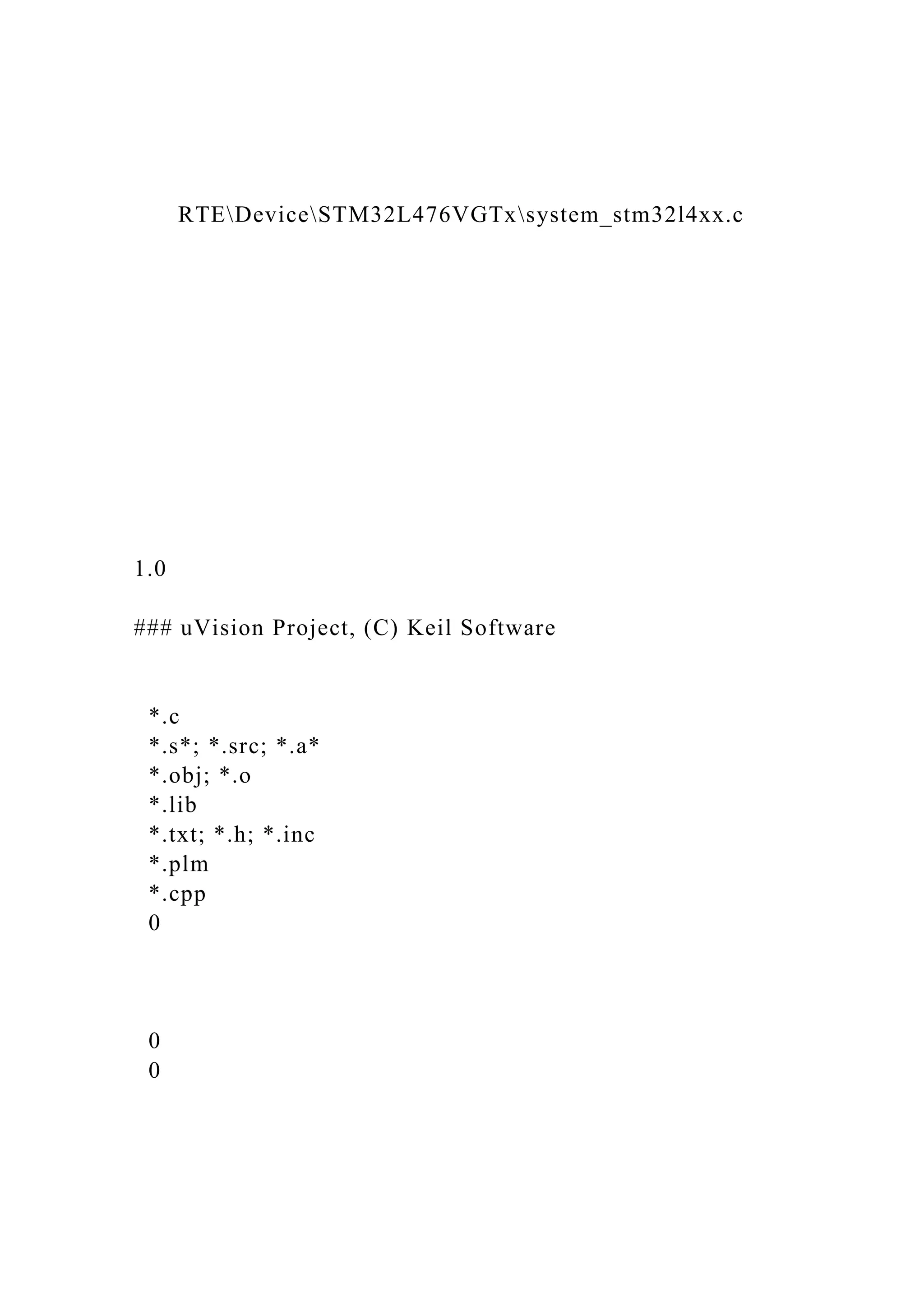
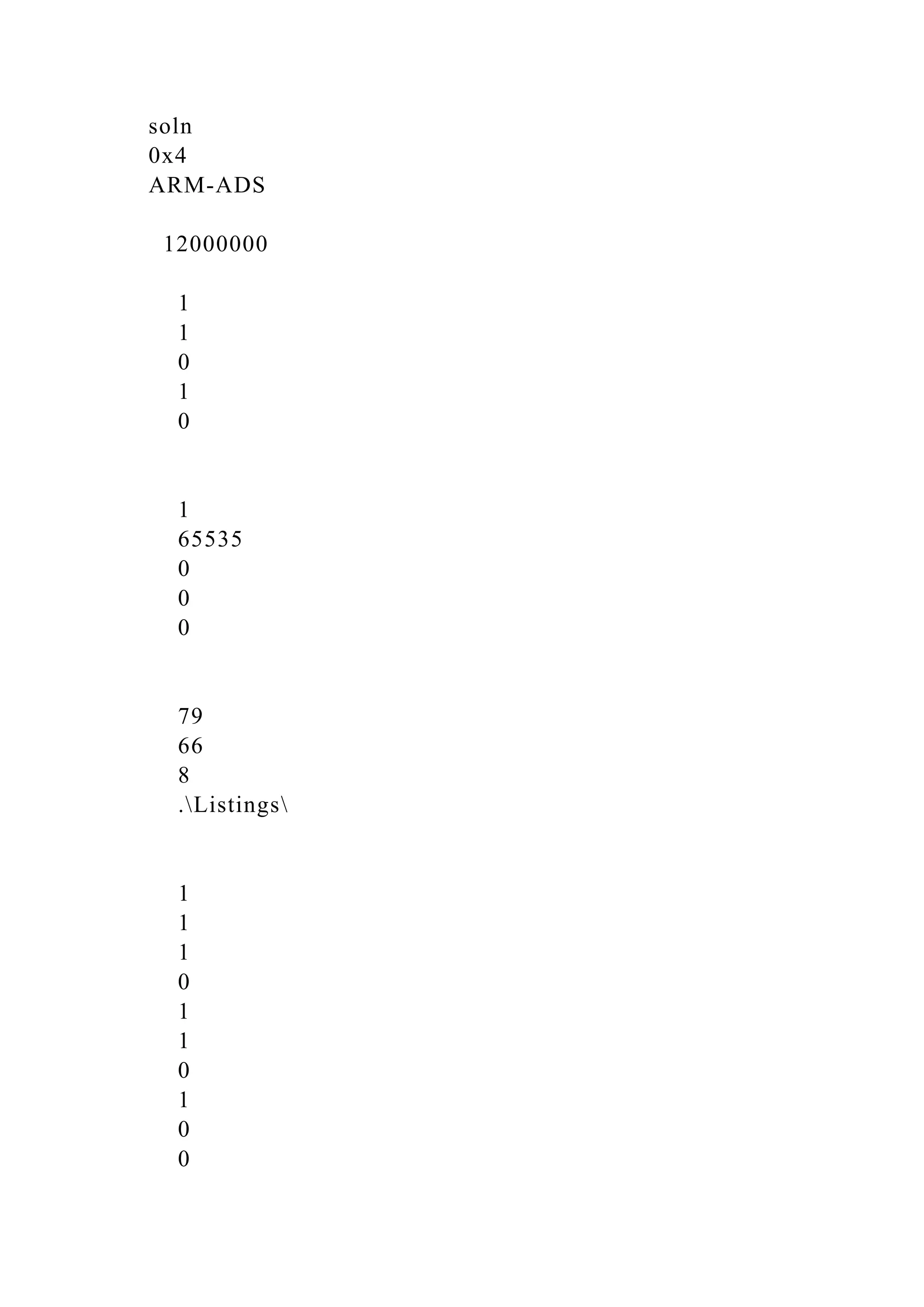
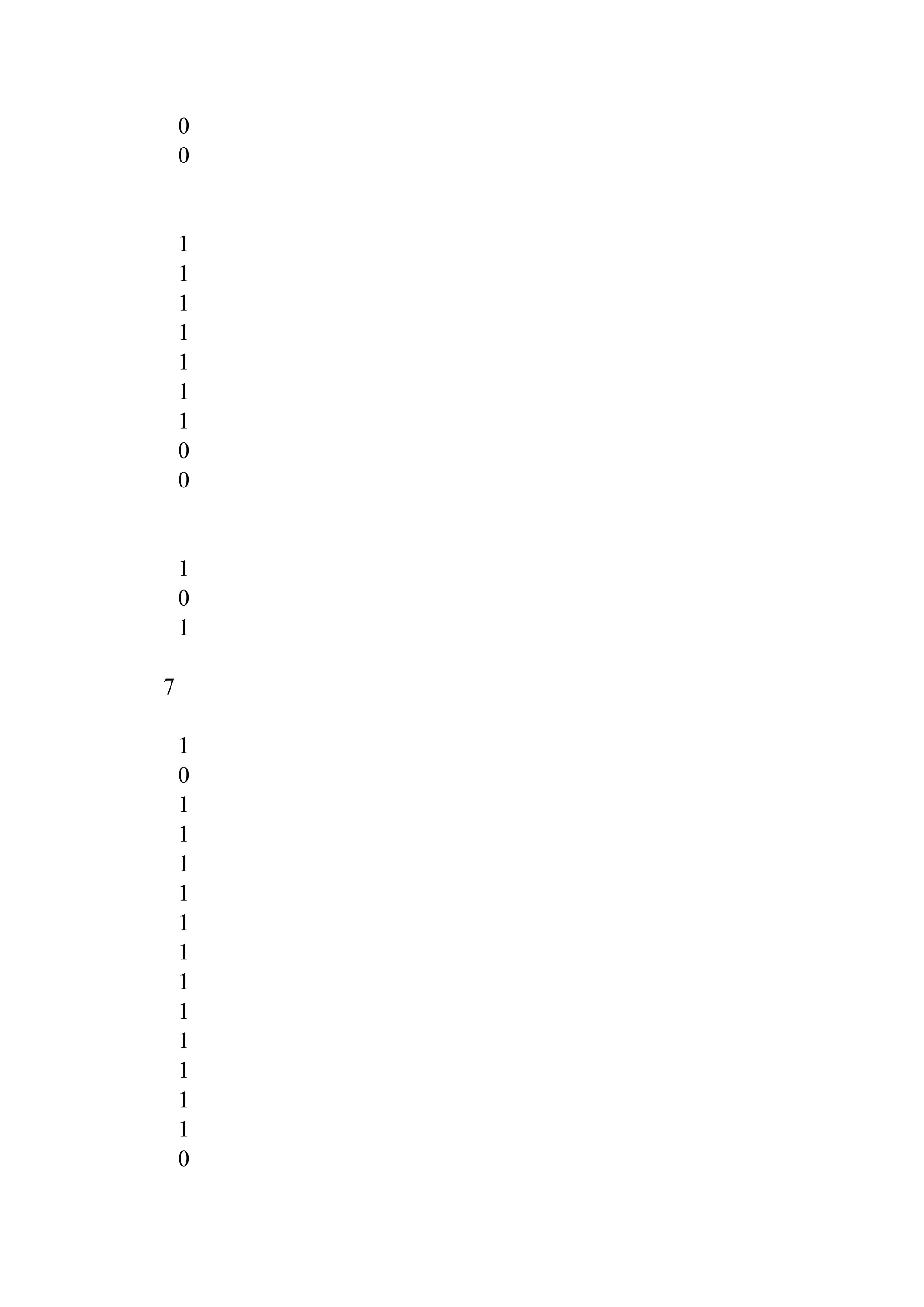
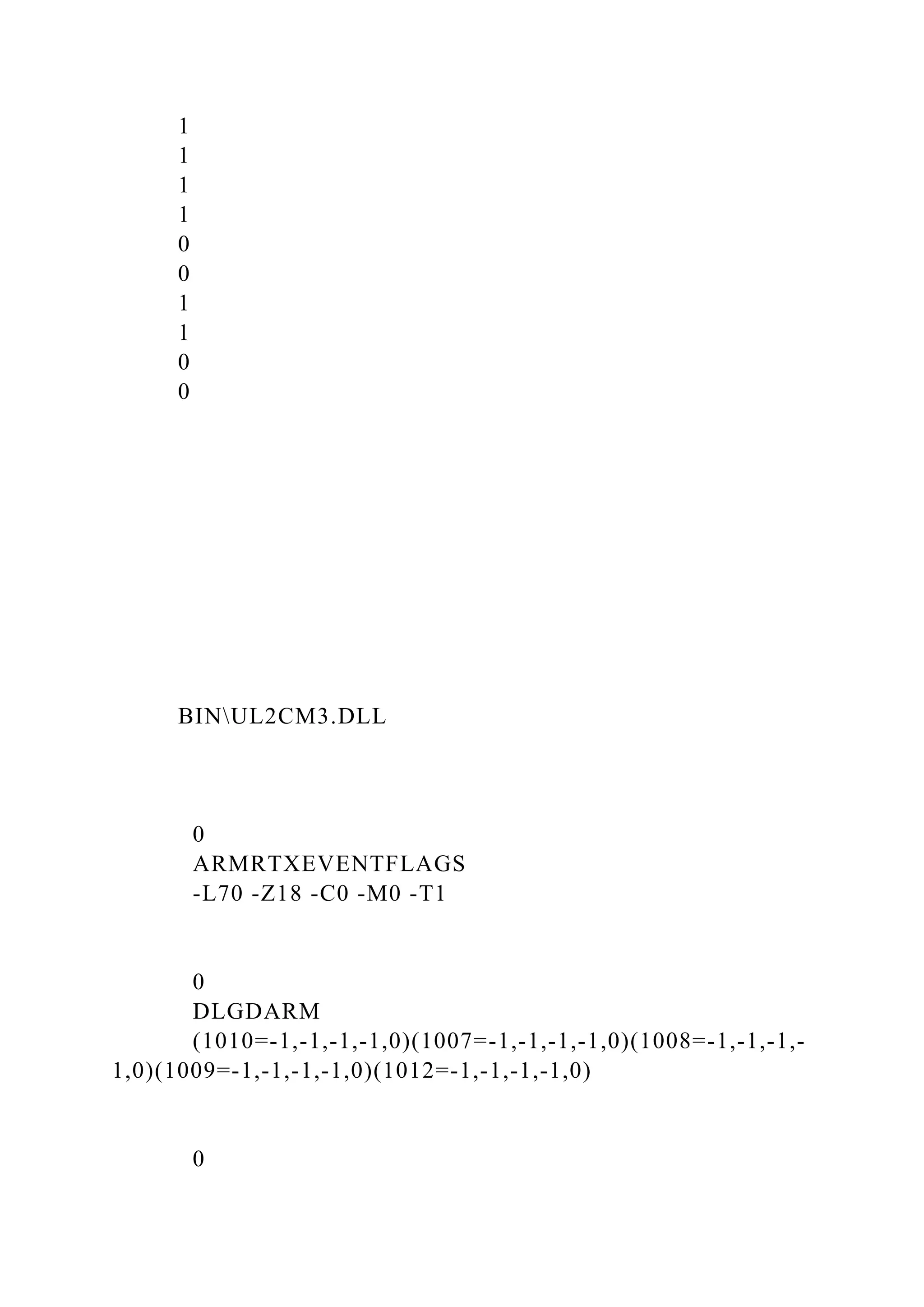
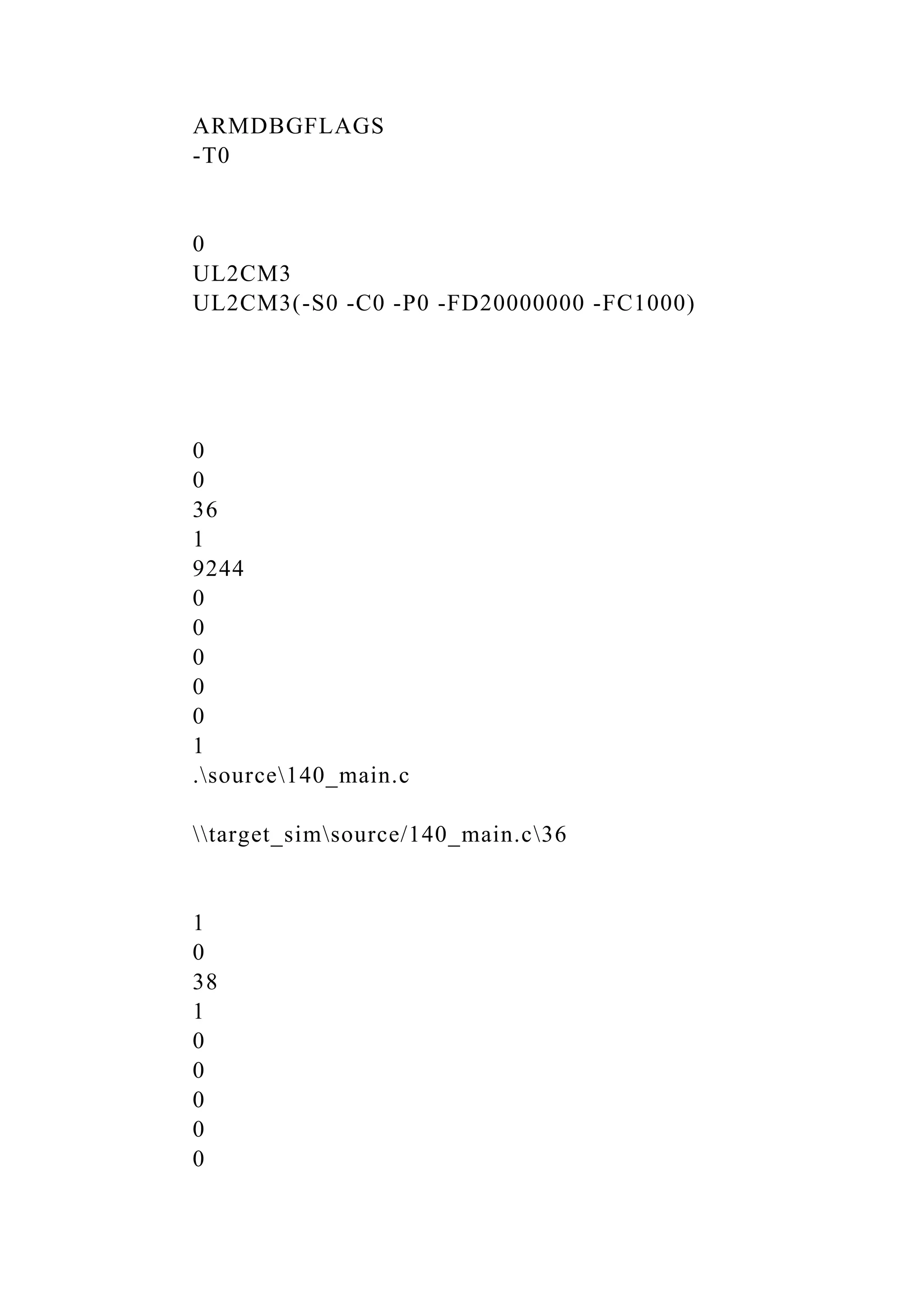
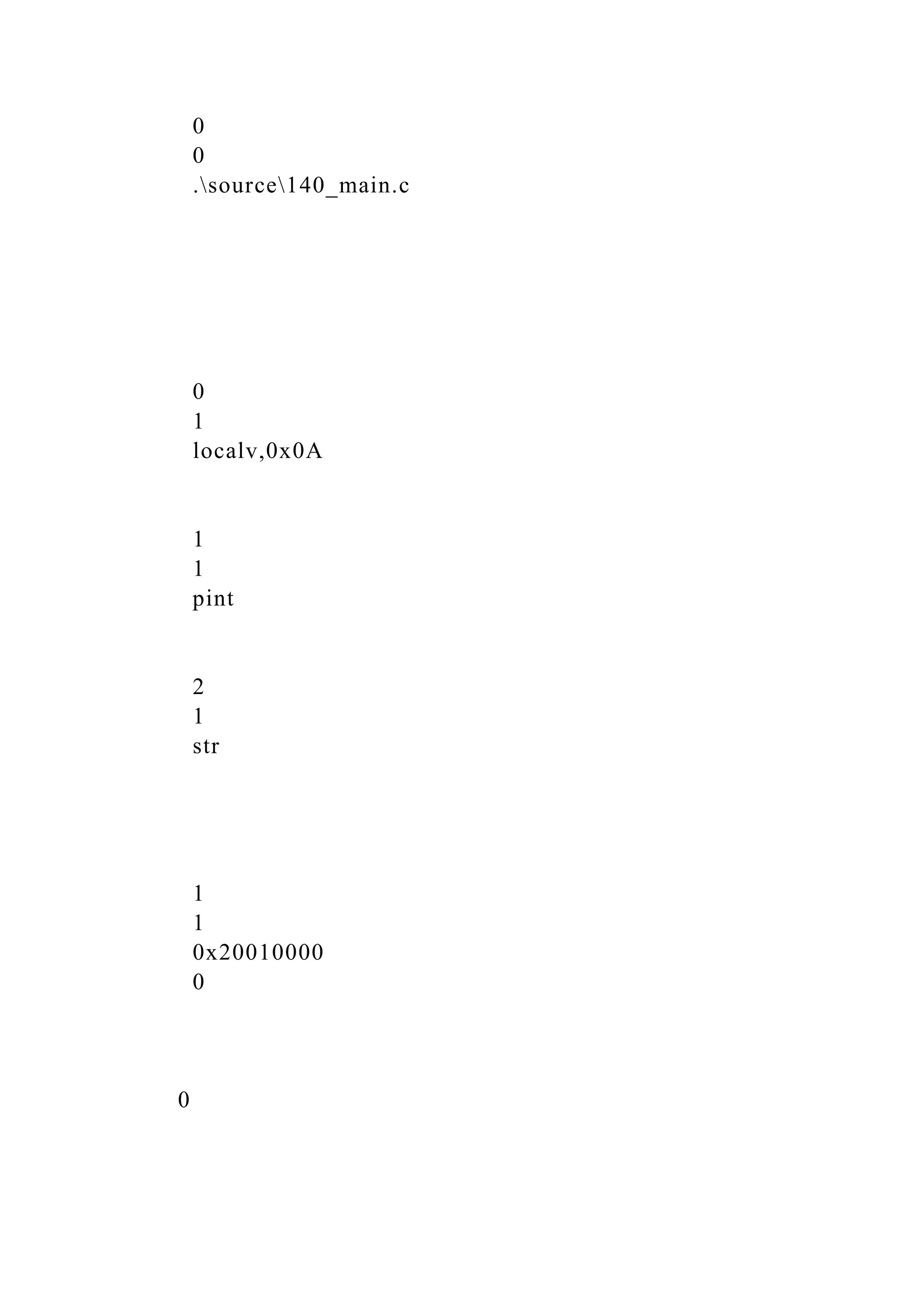

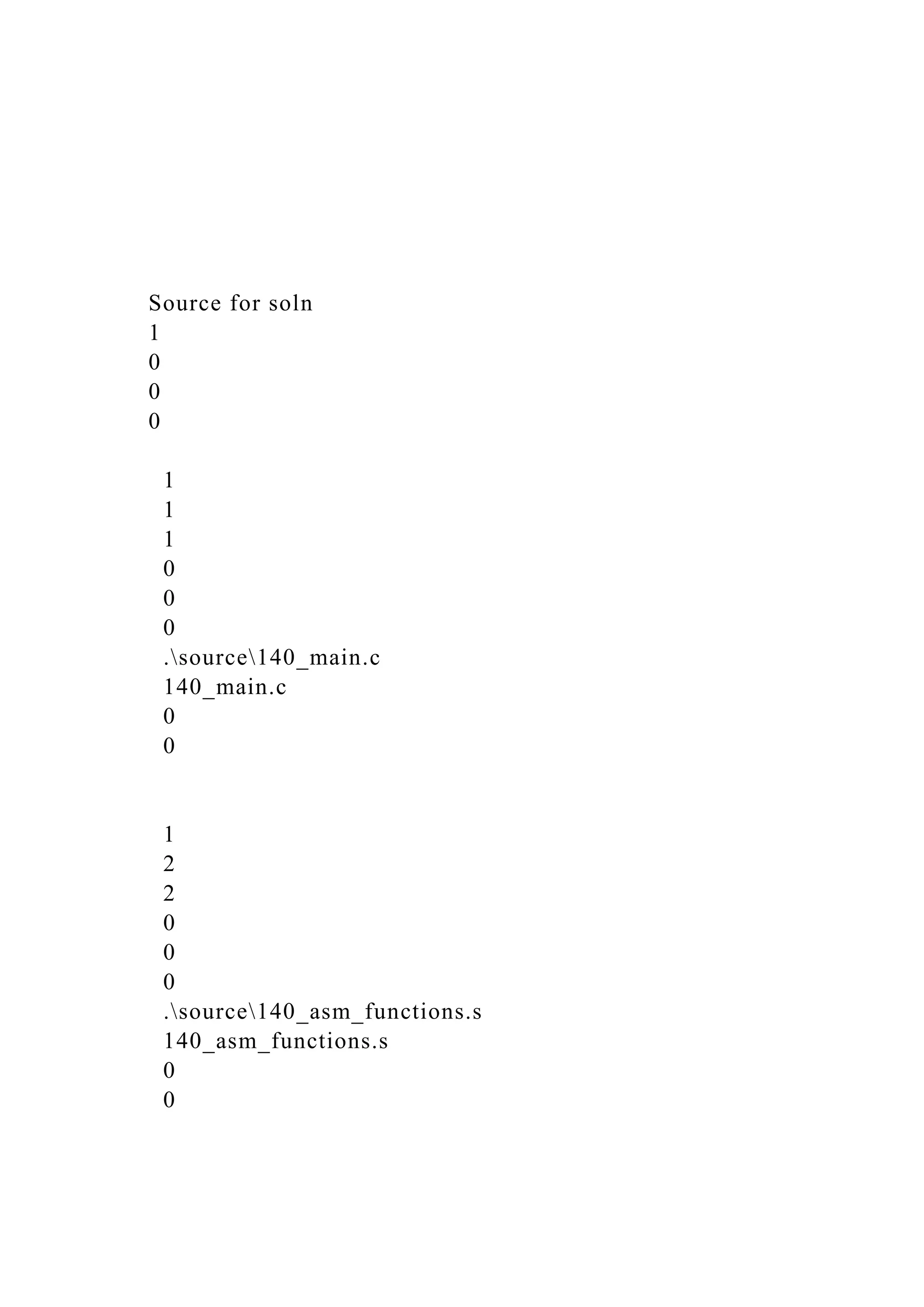
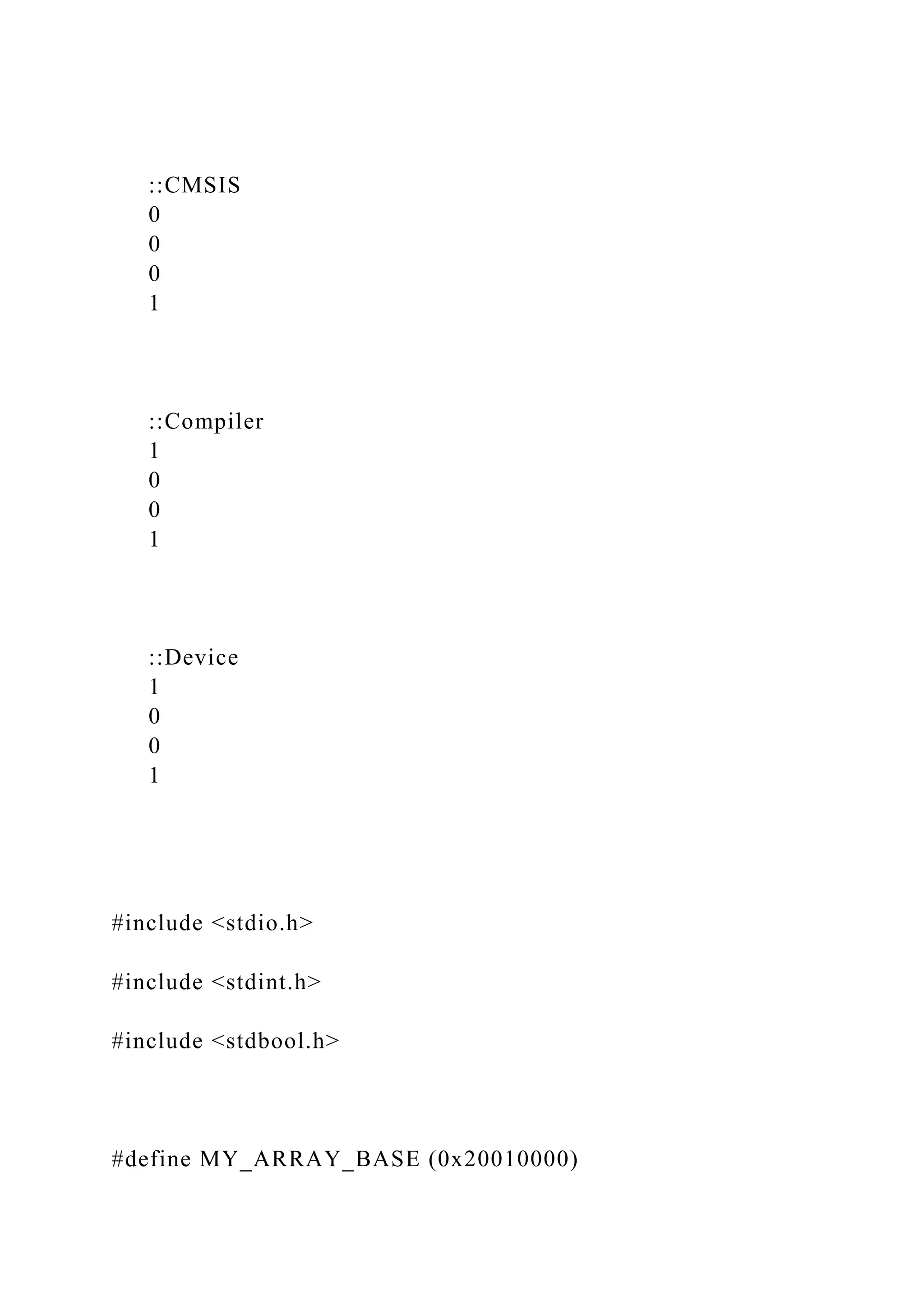
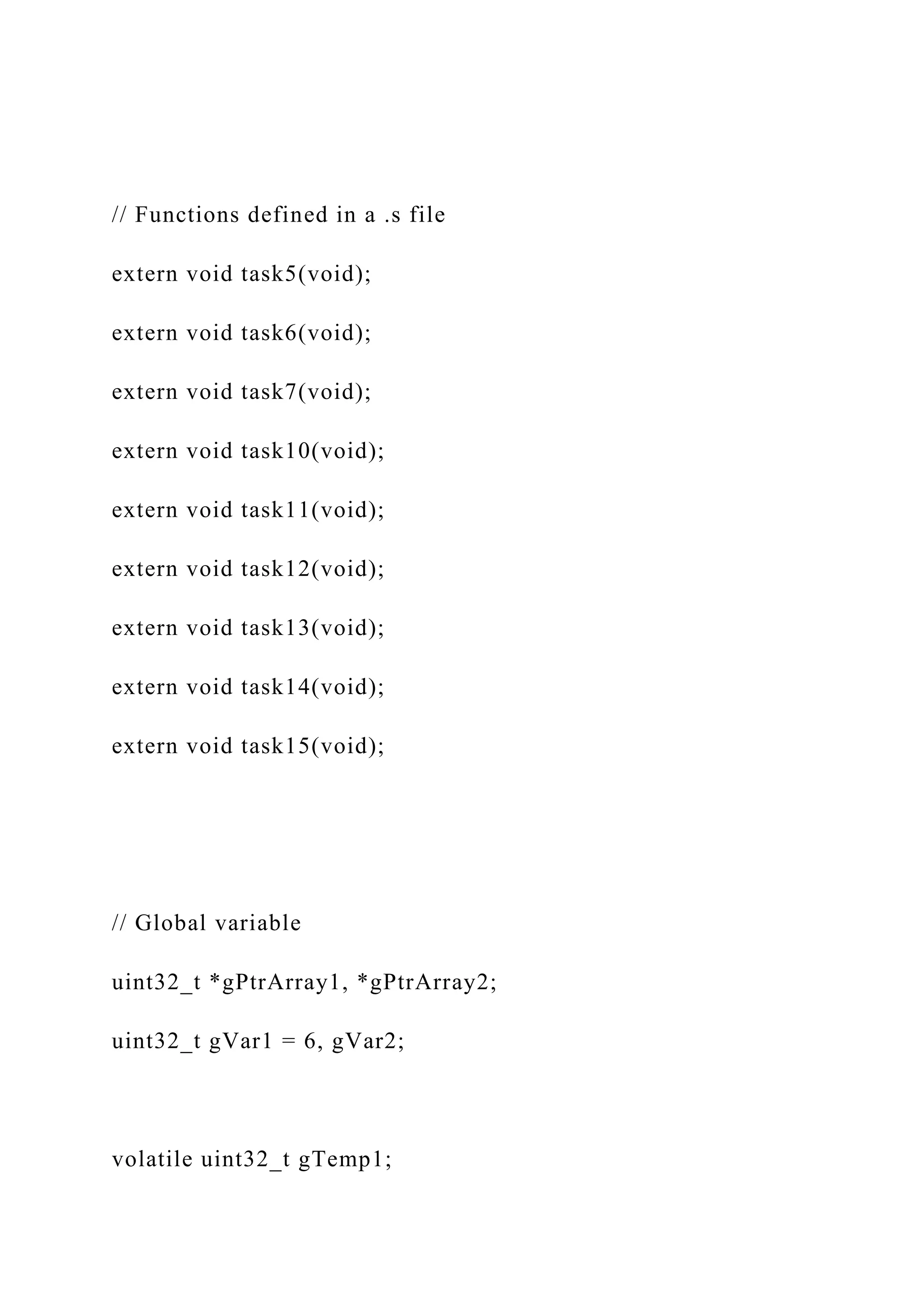
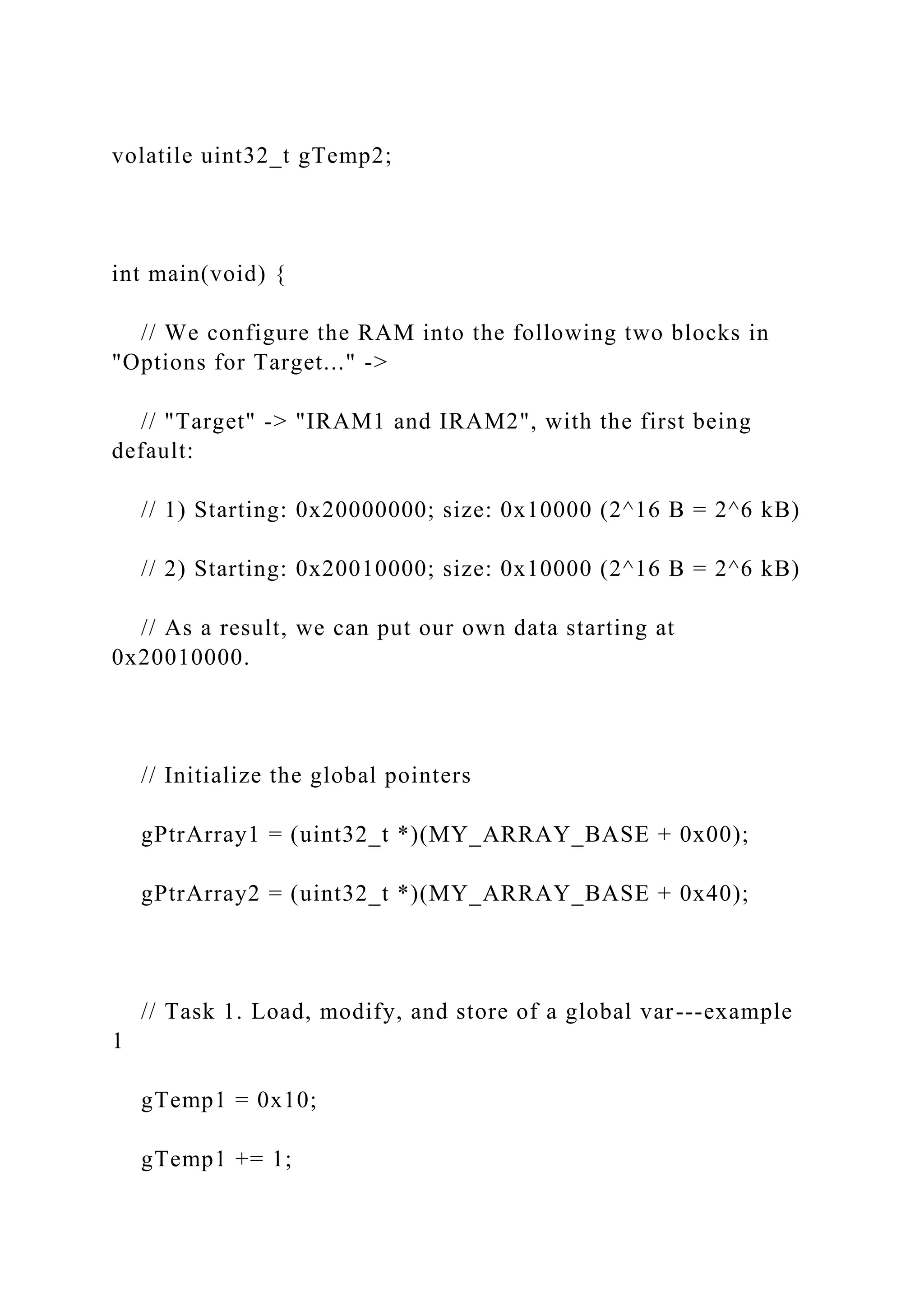
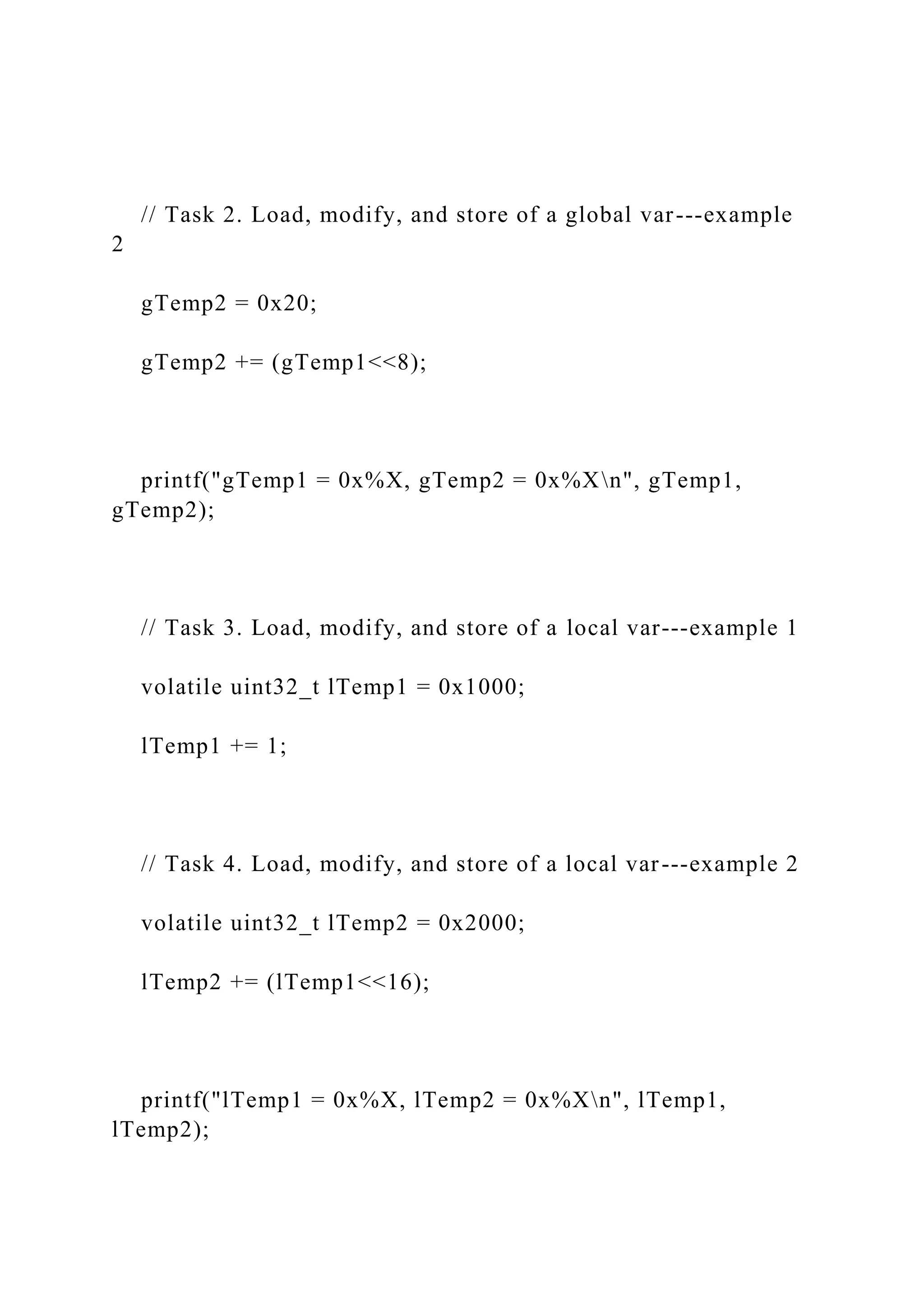
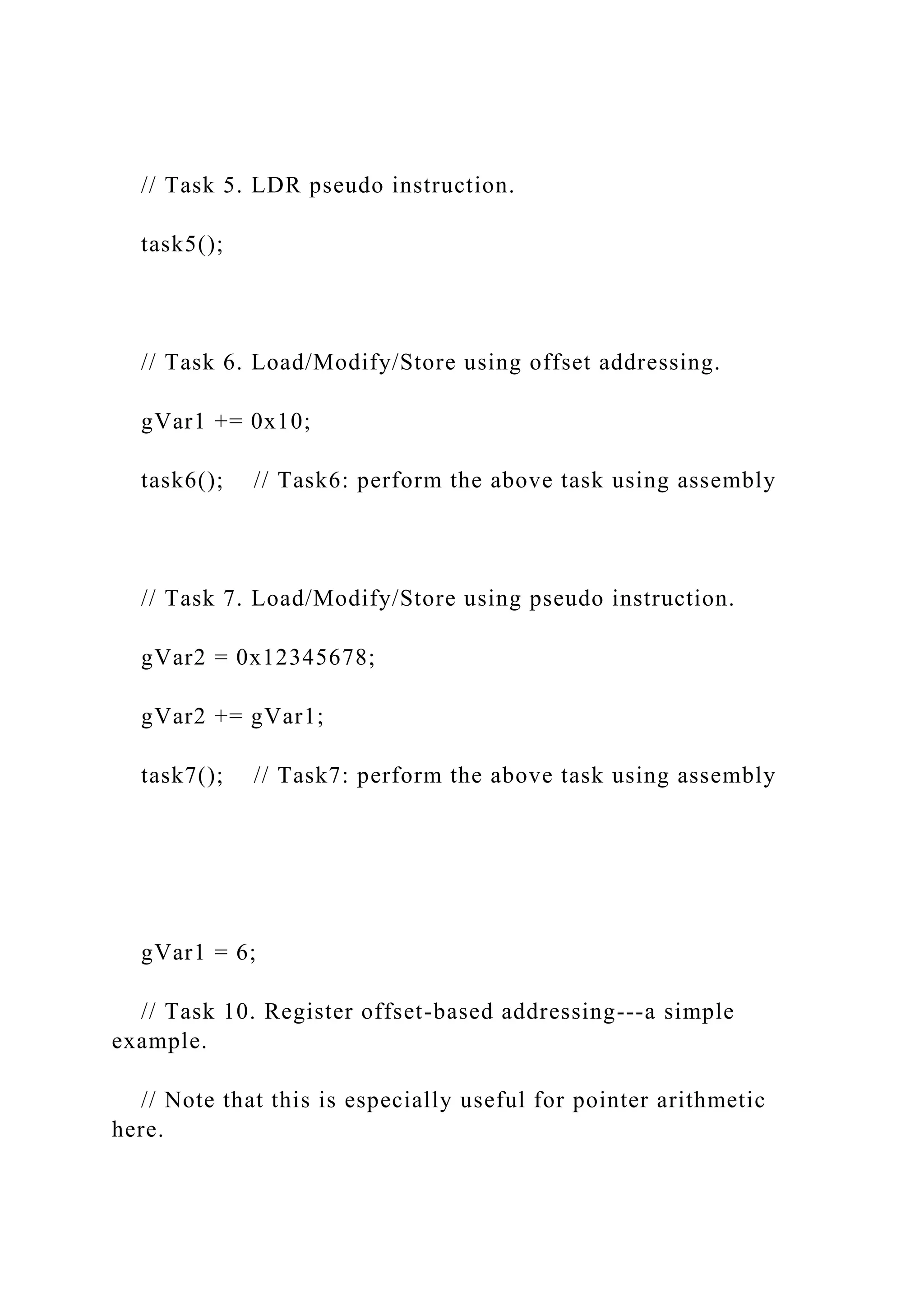
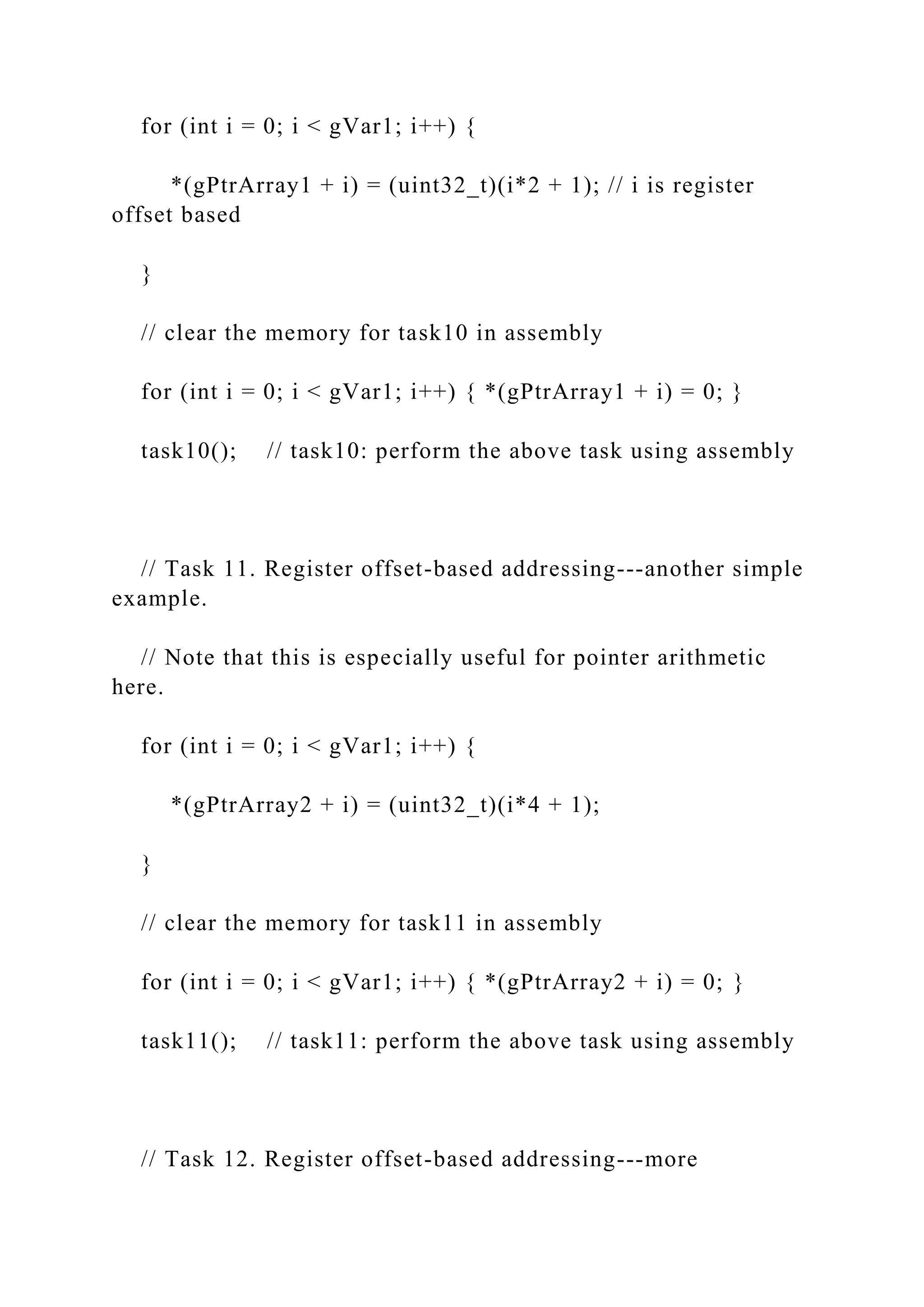
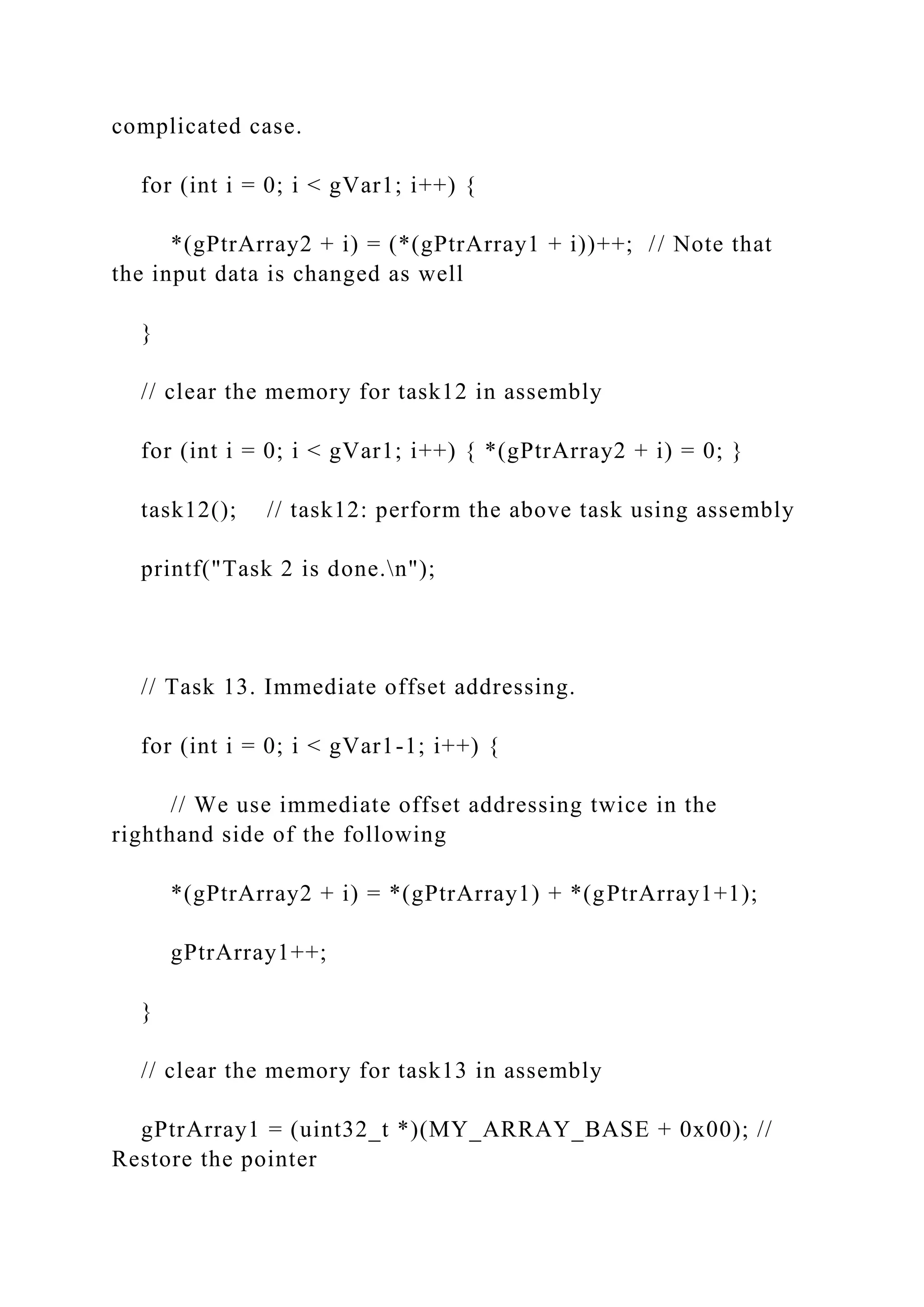
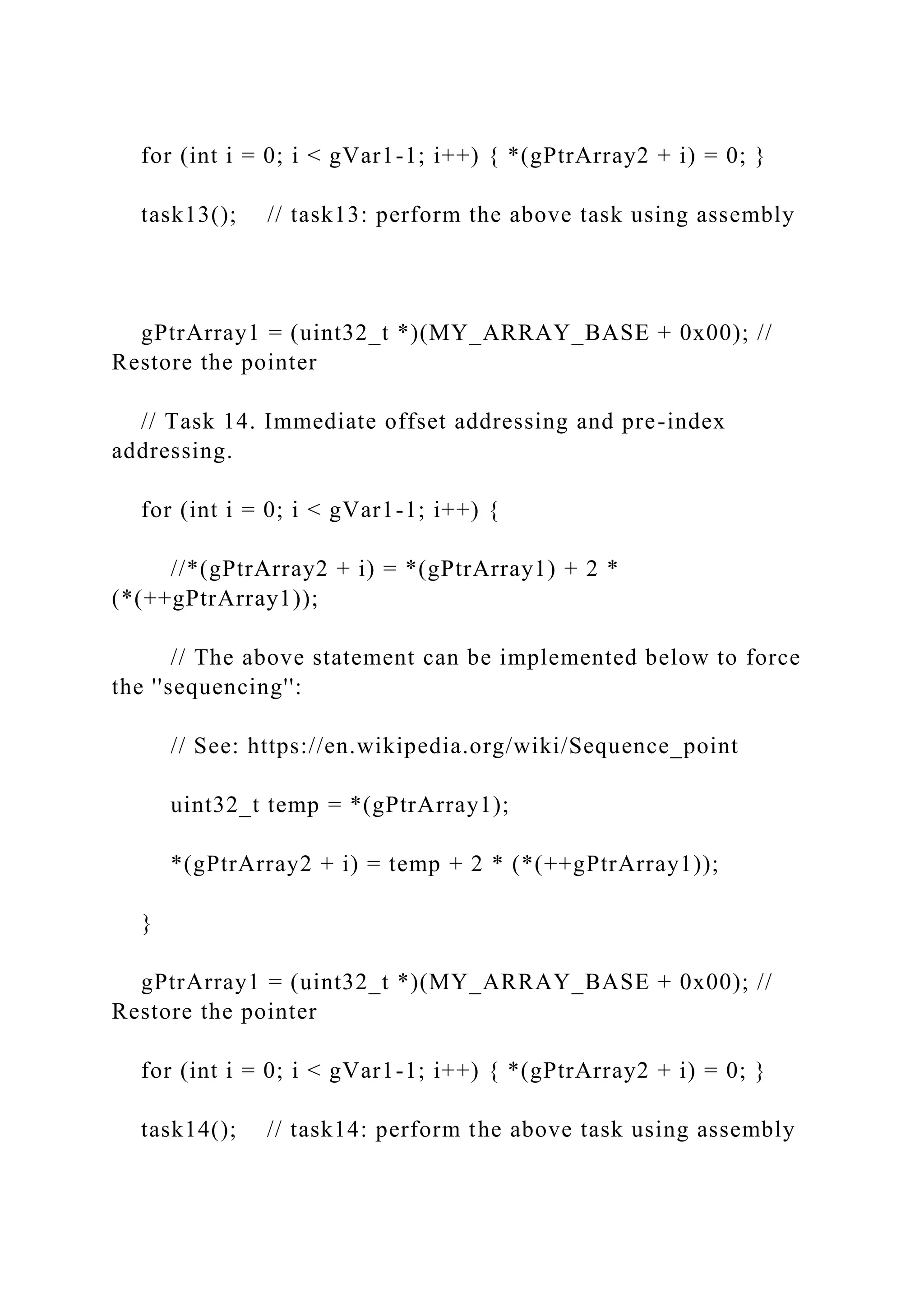
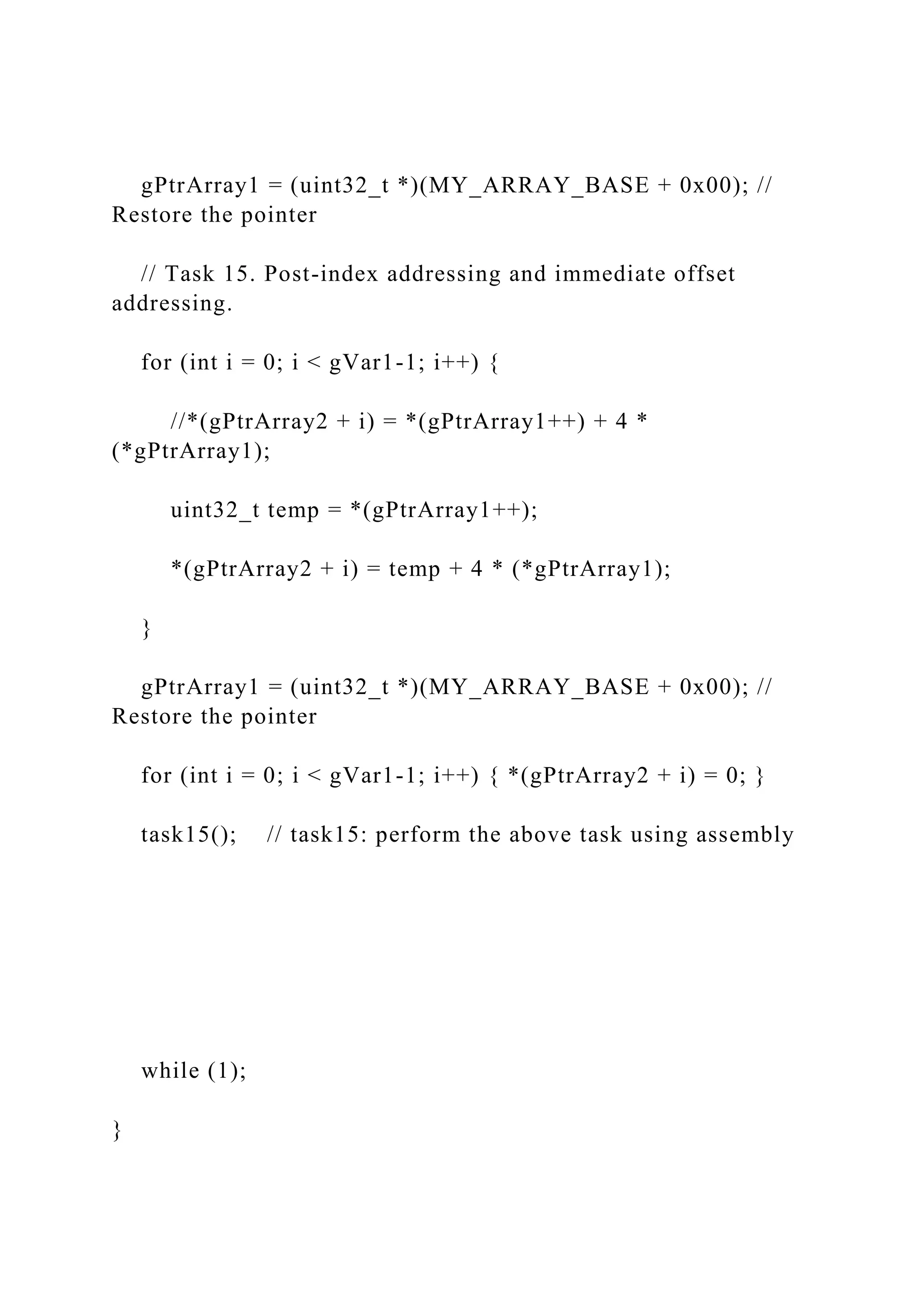
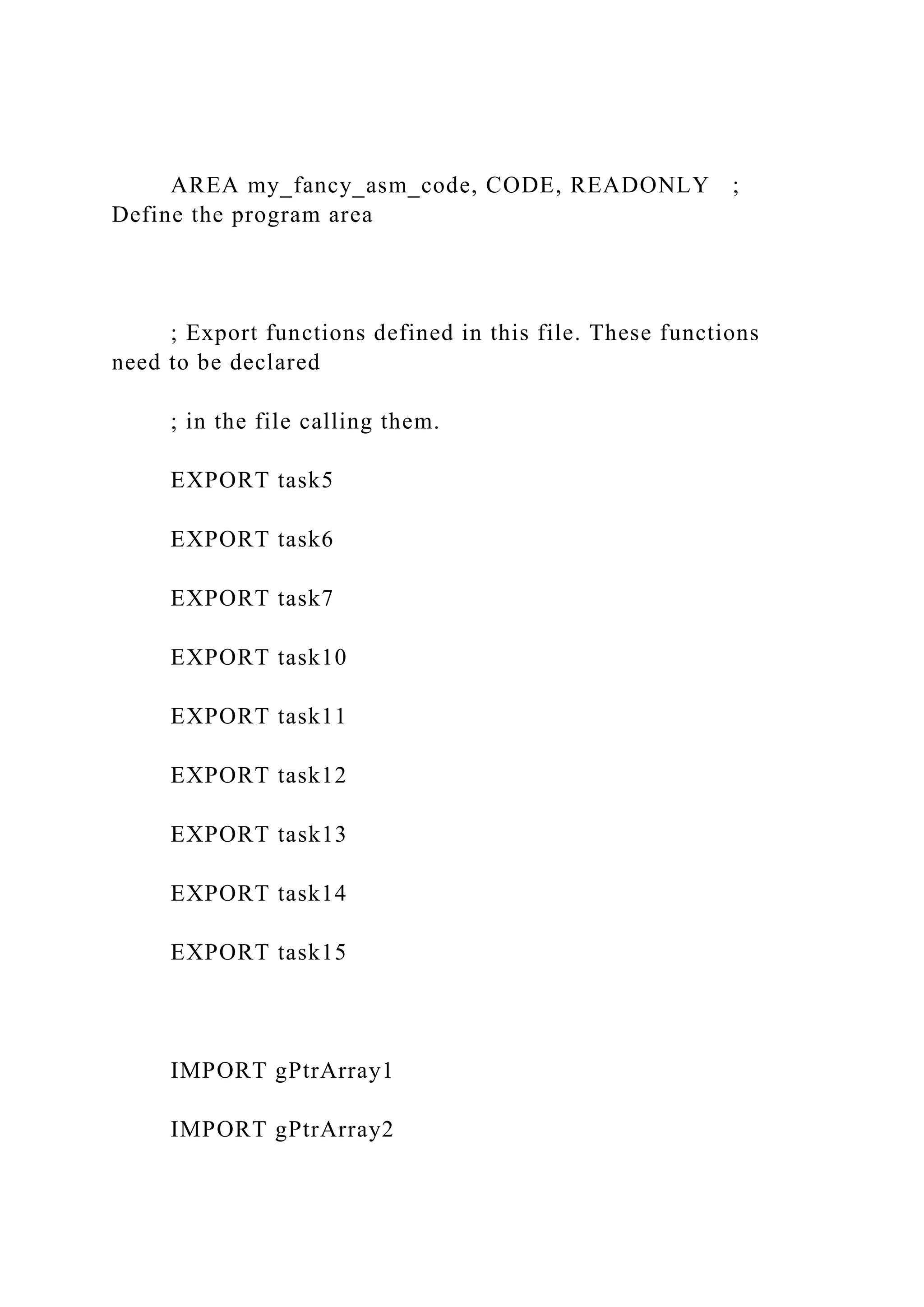
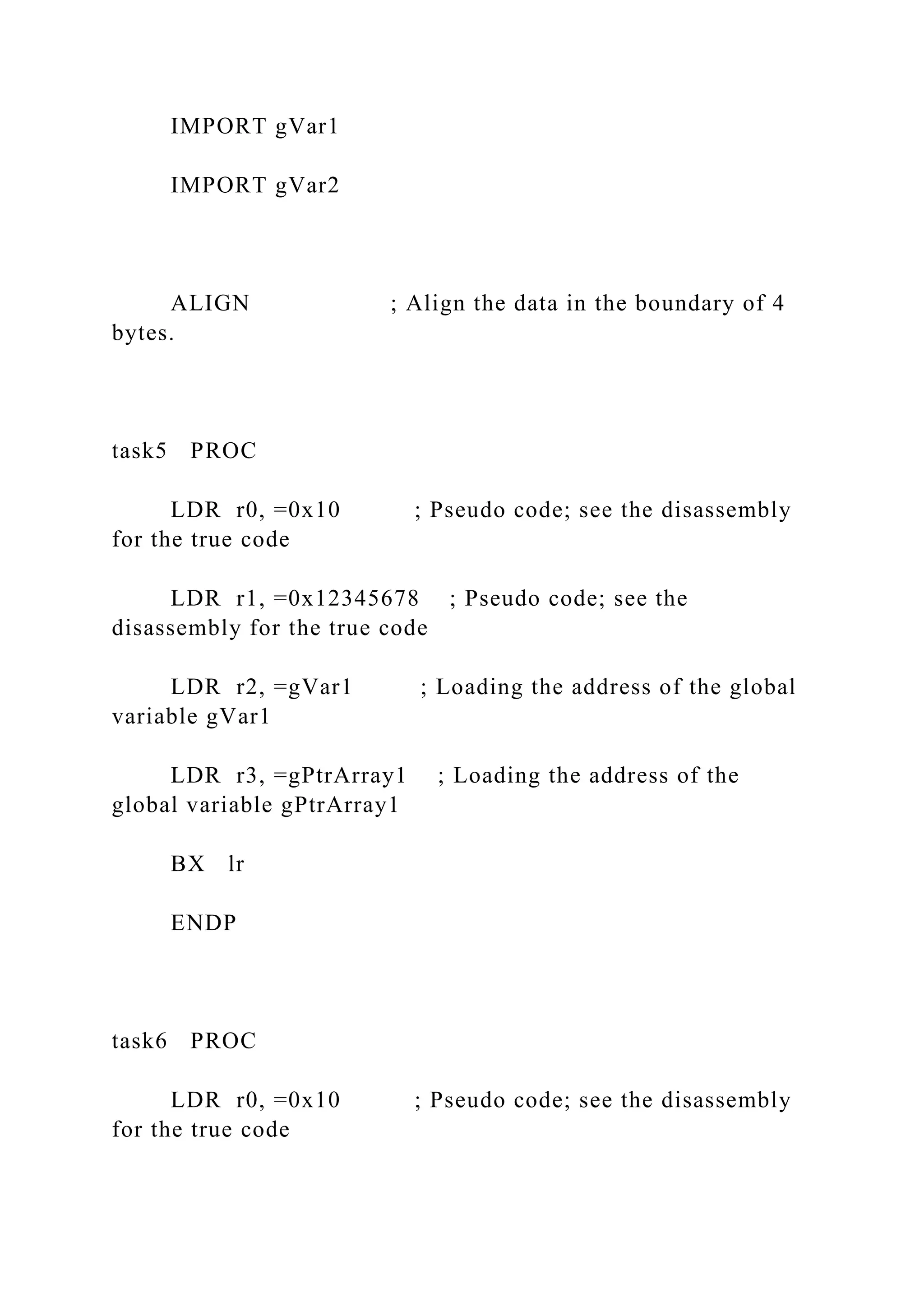
![LDR r1, =gVar1 ; Loading the address of the global
variable gVar1
LDR r2, [r1]
ADD r0, r2
STR r0, [r1]
BX lr
ENDP
task7 PROC
LDR r0, =0x12345678 ; Pseudo code; see the
disassembly for the true code
LDR r1, =gVar1
LDR r1, [r1]
ADD r0, r1
LDR r2, =gVar2 ; Loading the address of the global
variable gVar2
STR r0, [r2]
BX lr
ENDP](https://image.slidesharecdn.com/2-221201191009-4d5658c3/75/2-1-uVision-Project-C-Keil-Software-docx-33-2048.jpg)
![task10 PROC
LDR r0, =gPtrArray1 ; Loading the address of the
global variable gPtrArray1
LDR r0, [r0] ; Loading the content of the global
variable gPtrArray1
LDR r1, =gVar1 ; Loading the address of the global
variable gVar1
LDR r1, [r1] ; Loading the content of the global
variable gVar1
MOV r2, #0 ; variable (int) i
task10_loop
CMP r2, r1 ; test = r2 - r1
BGE task10_end ; if test >= 0, then branch to
task10_end
MOV r3, r2, LSL #1 ; r3 <- 2 * r2
ADD r3, #1 ; r3 <- r3 + 1
STR r3, [r0, r2, LSL #2] ; r3 -> mem[r0 + 4*r2] or r3 ->
mem[r0 + i]
ADD r2, #1 ; r2 <- r2 + 1
B task10_loop ; branch to task10_loop
task10_end](https://image.slidesharecdn.com/2-221201191009-4d5658c3/75/2-1-uVision-Project-C-Keil-Software-docx-34-2048.jpg)
![BX lr ; return
ENDP
; If you need to use registers starting from r4, you need to
PUSH them first to save the
; run-time environment for the caller. You need to POP them up
at the exit of the code.
task11 PROC
LDR r0, =gPtrArray2
LDR r0, [r0]
LDR r1, =gVar1
LDR r1, [r1]
MOV r2, #0
task11_loop
CMP r2, r1
BGE task11_end
MOV r3, r2, LSL #2
ADD r3, #1](https://image.slidesharecdn.com/2-221201191009-4d5658c3/75/2-1-uVision-Project-C-Keil-Software-docx-35-2048.jpg)
![STR r3, [r0, r2, LSL #2]
ADD r2, #1
B task11_loop
task11_end
BX lr
ENDP
task12 PROC
PUSH {r4, lr}
LDR r0, =gPtrArray1
LDR r0, [r0]
LDR r4, =gPtrArray2
LDR r4, [r4]
LDR r1, =gVar1
LDR r1, [r1]
MOV r2, #0
task12_loop
CMP r2, r1](https://image.slidesharecdn.com/2-221201191009-4d5658c3/75/2-1-uVision-Project-C-Keil-Software-docx-36-2048.jpg)
![BGE task12_end
LDR r3, [r0, r2, LSL #2]
STR r3, [r4, r2, LSL #2]
ADD r3, #1
STR r3, [r0, r2, LSL #2]
ADD r2, #1
B task12_loop
task12_end
POP {r4, pc} ; Pop lr to pc, which is the same as BX
lr.
ENDP
task13 PROC
PUSH {r4-r5, lr}
LDR r0, =gPtrArray1
LDR r0, [r0]
LDR r4, =gPtrArray2
LDR r4, [r4]](https://image.slidesharecdn.com/2-221201191009-4d5658c3/75/2-1-uVision-Project-C-Keil-Software-docx-37-2048.jpg)
![LDR r1, =gVar1
LDR r1, [r1]
SUB r1, #1
MOV r2, #0
task13_loop
CMP r2, r1
BGE task13_end
LDR r3, [r0]
LDR r5, [r0, #4]
ADD r3, r5
STR r3, [r4, r2, LSL #2]
ADD r2, #1
ADD r0, #4
B task13_loop
task13_end
POP {r4-r5, pc}
ENDP](https://image.slidesharecdn.com/2-221201191009-4d5658c3/75/2-1-uVision-Project-C-Keil-Software-docx-38-2048.jpg)
![task14 PROC
PUSH {r4-r5, lr}
LDR r0, =gPtrArray1
LDR r0, [r0]
LDR r4, =gPtrArray2
LDR r4, [r4]
LDR r1, =gVar1
LDR r1, [r1]
SUB r1, #1
MOV r2, #0
task14_loop
CMP r2, r1
BGE task14_end
LDR r3, [r0]
LDR r5, [r0, #4]!
ADD r3, r5, LSL #1
STR r3, [r4, r2, LSL #2]
ADD r2, #1](https://image.slidesharecdn.com/2-221201191009-4d5658c3/75/2-1-uVision-Project-C-Keil-Software-docx-39-2048.jpg)
![B task14_loop
task14_end
POP {r4-r5, pc}
ENDP
task15 PROC
PUSH {r4-r5, lr}
LDR r0, =gPtrArray1
LDR r0, [r0]
LDR r4, =gPtrArray2
LDR r4, [r4]
LDR r1, =gVar1
LDR r1, [r1]
SUB r1, #1
MOV r2, #0
task15_loop
CMP r2, r1
BGE task15_end](https://image.slidesharecdn.com/2-221201191009-4d5658c3/75/2-1-uVision-Project-C-Keil-Software-docx-40-2048.jpg)
![LDR r3, [r0], #4
LDR r5, [r0]
ADD r3, r5, LSL #2
STR r3, [r4, r2, LSL #2]
ADD r2, #1
B task15_loop
task15_end
POP {r4-r5, pc}
ENDP
END ; End of the entire file
AREA my_fancy_asm_code, CODE, READONLY ;
Define the program area
; Export functions defined in this file. These functions
need to be declared
; in the file calling them.
EXPORT task10](https://image.slidesharecdn.com/2-221201191009-4d5658c3/75/2-1-uVision-Project-C-Keil-Software-docx-41-2048.jpg)
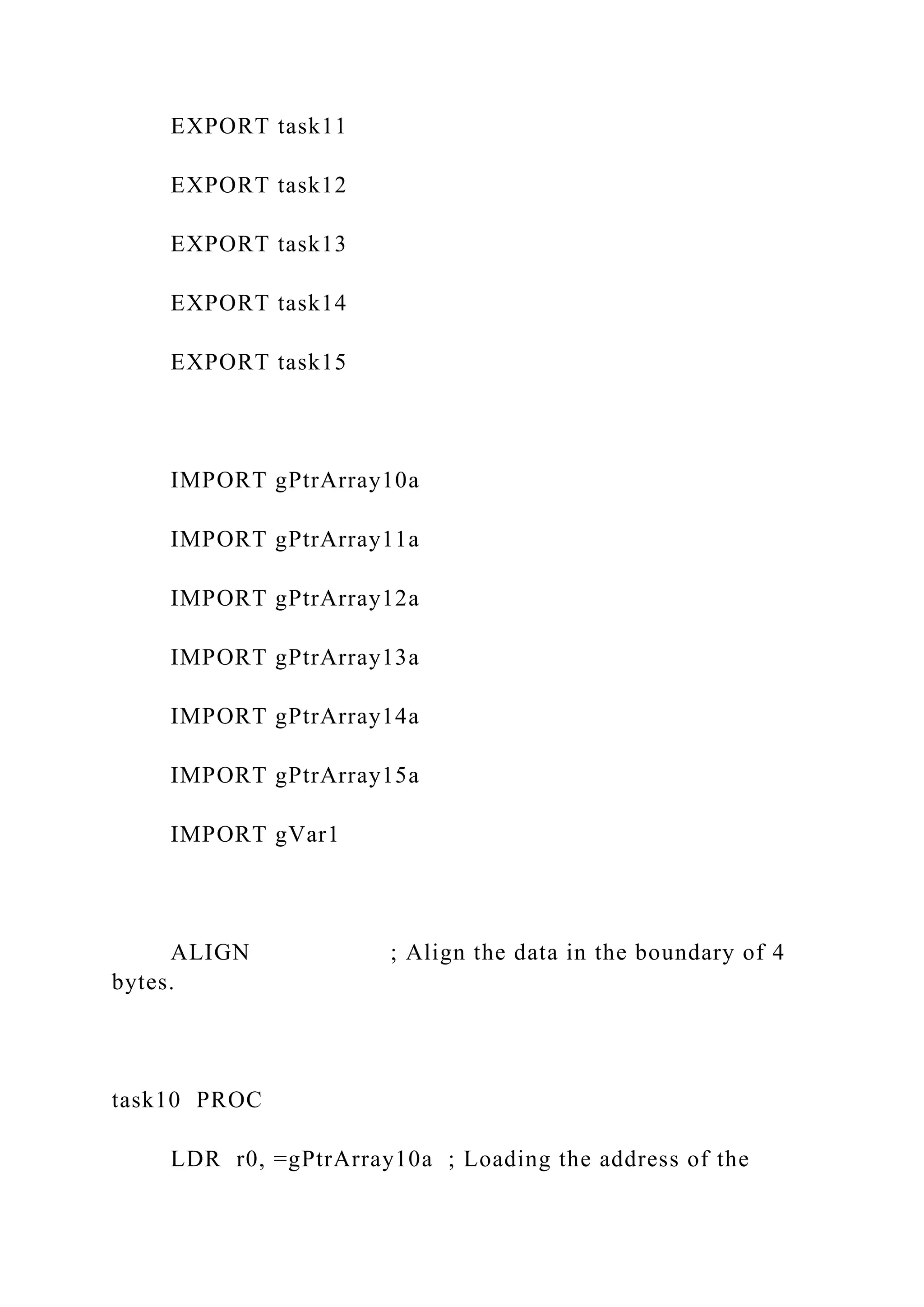
![global variable gPtrArray10a
LDR r0, [r0] ; Loading the content of the global
variable gPtrArray10a
LDR r1, =gVar1 ; Loading the address of the global
variable gVar1
LDR r1, [r1] ; Loading the content of the global
variable gVar1
MOV r2, #0 ; variable (int) i
task10_loop
CMP r2, r1 ; test = r2 - r1
BGE task10_end ; if test >= 0, then branch to
task10_end
MOV r3, r2, LSL #2 ; r3 <- r2 * 4
SUB r3, #15 ; r3 <- r3 - 15
STRB r3, [r0, r2] ; r3 -> mem[r0 + r2] or r3 ->
mem[r0 + i]
ADD r2, #1 ; r2 <- r2 + 1
B task10_loop ; branch to task10_loop
task10_end
BX lr ; return
ENDP](https://image.slidesharecdn.com/2-221201191009-4d5658c3/75/2-1-uVision-Project-C-Keil-Software-docx-43-2048.jpg)
![; If you need to use registers starting from r4, you need to
PUSH them first to save the
; run-time environment for the caller. You need to POP them up
at the exit of the code.
task11 PROC
BX lr
ENDP
task12 PROC
PUSH {r4-r5, lr}
LDR r0, =gPtrArray10a
LDR r0, [r0]
LDR r4, =gPtrArray12a
LDR r4, [r4]
LDR r1, =gVar1
LDR r1, [r1]
MOV r2, #0](https://image.slidesharecdn.com/2-221201191009-4d5658c3/75/2-1-uVision-Project-C-Keil-Software-docx-44-2048.jpg)
![task12_loop
CMP r2, r1
BGE task12_end
LDRSB r3, [r0, r2]
LDR r5, =10
SUB r5, r3
STRH r5, [r4, r2, LSL #1]
ADD r3, #1
STRB r3, [r0, r2]
ADD r2, #1
B task12_loop
task12_end
POP {r4-r5, pc} ; Pop lr to pc, which is the same as
BX lr.
ENDP
task13 PROC
PUSH {r4-r5, lr}](https://image.slidesharecdn.com/2-221201191009-4d5658c3/75/2-1-uVision-Project-C-Keil-Software-docx-45-2048.jpg)
![POP {r4-r5, pc}
ENDP
task14 PROC
PUSH {r4-r5, lr}
LDR r0, =gPtrArray12a
LDR r0, [r0]
LDR r4, =gPtrArray14a
LDR r4, [r4]
LDR r1, =gVar1
LDR r1, [r1]
SUB r1, #1
MOV r2, #0
task14_loop
CMP r2, r1
BGE task14_end
LDRSH r3, [r0]
LDRSH r5, [r0, #2]!](https://image.slidesharecdn.com/2-221201191009-4d5658c3/75/2-1-uVision-Project-C-Keil-Software-docx-46-2048.jpg)
![ADD r3, r5, LSL #3
STR r3, [r4, r2, LSL #2]
ADD r2, #1
B task14_loop
task14_end
POP {r4-r5, pc}
ENDP
task15 PROC
PUSH {r4-r5, lr}
POP {r4-r5, pc}
ENDP
END
#include <stdio.h>
#include <stdint.h>
#include <stdbool.h>](https://image.slidesharecdn.com/2-221201191009-4d5658c3/75/2-1-uVision-Project-C-Keil-Software-docx-47-2048.jpg)
